#who lack literally any degree of consciousness of their own mess
Text
some of y'all never had parents who aggressively shamed you for making even a little mess or even just mere evidence of your existence and it shows
#personal#ignore me#directed at people off of tumblr#who lack literally any degree of consciousness of their own mess#never mind basic conscientiousness toward others around them#it's one thing to make a mess in your own room - your personal space where only you live and no one else usually goes#it's another thing entirely to just. drop food and trash and toys and other belongings anywhere they happen to fall out of your hands#treating the floor of communal areas like it is one massive dumpster that you live and play in#and not caring at all about the fact that such mess stresses literally everyone else in the house out#including the pets!!!!#mama cat has to wade through an ocean of toys and garbage just to get to the ONE SPOT *I* cleaned up for her to keep her new babies in!!#i am not a maid!!!!!!!!#i should not have to clean up after you!!!!!!!!!!!!!!#I'm gonna start charging for it i swear to motherfucking zeus#like i understand there is a gulf of difference between 'not caring about cleaning bc your parents don't care and so you were never taught'#and 'raised by an abusive parent who was a hoarder herself but god forbid her kids' rooms don't look like magazine spreads'#but there's GOT to be some fucking middle ground to be found here. meet me in the fucking middle.
6 notes
·
View notes
Text
“The 02 characters didn’t get any character development”
Yes, they did.
“But -- “
Yes, they did.
Having had the gift of having rewatched 02 recently, I have to say that it still really, really confuses me how the hell people get this impression. It’s not even “I’m trying to see the best out of this” but that I genuinely do not get it, because as far as I’m able to see it’s pretty much literally right there!! This isn’t even tinfoil hat tier!
But in case you have any doubts, sit down because Shiha’s gonna sit here and write a meta about the 02 kids, and how they are perfectly reasonable characters that developed properly fine over the course of the series.
(All below translations of 02 dialogue are by PositronCannon.)
So the first thing to understand about 02 is that it is fundamentally made with a very different writing approach from Adventure in the first place, and therefore it is not meant to be compared in a one-to-one fashion.
This is a point I’ve said many times over and over, and I think it’s to the point where it shouldn’t even really need official clarification, but I’m just going to go ahead and bring up the words from Director Kakudou himself:
For instance, we had the prior series stick out in terms of its points about “what it means to be oneself”, and for 02 we made it so that you would pay attention to “the relationship between yourself and other people”.
Right, so: 02, by design, does not use Adventure’s character development methodology of “self-awareness”. It is built from the ground up by having its characters and character development predicated on relationships instead of singular characters. This might seem a bit odd on its face, but no man is an island, and, in fact, changing the way you interact with other people and with the world in general does speak a lot about one’s personal growth in its own way. And this also means that if you try to analyze 02 by holding it to Adventure-based standards of “character focus episodes” or the like, you’re already on a losing battle.
This means that character growth in 02 is not presented in a way where it’s up-front and center, but rather something you have to glean over the natural course of the series. We’re working off relationships, so you have to actually pay attention to the natural interactions between the characters or what they say even during “off-hours” -- the focus-episode format used by Adventure doesn’t apply here anymore. And it’s something apparent enough from how “evolution” is a metaphor for “personal growth” in this franchise -- in Adventure it was via the Crests, which meant self-awareness, but 02′s key evolutionary trump card is Jogress, which relies on the strength of relationships.
One thing I have to say in terms of my experience as a 02 fan is that I’ve found I actually appreciated it significantly more as an adult than I did as a kid, and that, in general, a lot of the things to appreciate about 02 are things that you really viscerally feel and understand when you’ve gotten that degree of life experience under your belt. Unfortunately, this is kind of a double-edged sword, too, because it ends up becoming the kind of series that often risks going over the heads of the very audience of children it was supposed to be targeting. It’s got a lot of very nuanced depictions of mental health and the childhood experience that are maddeningly subtle, to the point of possibly going over one’s head or even coming off as illogical without sufficient life experience, or simply just not being as visceral (the entire theme of “parents stroking their own ego with their kids’ achievements” hits the hardest when you’re college age).
So what this means is that 02 doesn’t exactly hand its themes or character development to you on a plate. But it is there, once you actually start looking for it.
Let’s start off by talking about our main core cast of characters. Adventure and 02 prided themselves on the fact that they tried very hard to not be adherent to anime tropes, but rather to portray well-rounded, nuanced characters that felt more like actual kids you might meet at school. So how does the 02 cast fare in not being pigeonholed anime tropes?
Daisuke: Even though official freely admits he has “the most anime-like personality”, it’s hard to say he actually falls that much into the generic shounen archetype. For one, he’s actually shockingly humble and polite in certain situations (he’s consistently polite with his elders, and is very quick to admit his own limitations). Actually, he comes off as a surprisingly friendly and deferential person -- it’s just that he happens to have somewhat of an abrasive exterior, and even then it’s implied heavily in the first half that this stems from a lack of validation and purpose. (He actually “deflates” really easily, so you can’t even say he’s all that arrogant past the surface.) Certainly he’s simple-minded, and kind of an idiot, but his abrasive exterior is actually pretty deceptive.
Miyako: Miyako floats an interesting duality of simultaneously being aggressively feminine and being aggressively un-feminine -- not necessarily in the sense she tries not to be feminine (on the contrary, she absolutely embraces it), but more that she’s also an aggressive, “inelegant” mess in ways atypical for a lead heroine in a shounen show, who are usually either cute or “badass action girls” and not...a mess. Despite that, she is also consistently portrayed as capable of heavy emotional depth and being very genuinely kind and concerned about others, which are not in any way diminished by the fact she happens to be an aggressive mess with a severe case of foot-in-mouth syndrome. It’s an interesting mix of character traits that you don’t see often.
Iori: “Designated young characters” usually fall into the “cute” archetype a la Adventure!Takeru or Tomoki, so it’s interesting that the youngest one is actually the most mature one, and impeccably polite at that (having been raised by a family that emphasizes formal manners and propriety). Even more interestingly, nobody actually treats him like he’s that much younger, and he’s given the weight of respect in a sense that has nothing to do with his age (think about how there are indeed quite a few kids who simply just get along better with older kids). Yet the series doesn’t shy away from his youth, and his overly black-and-white view of morality is portrayed as immaturity in its own way, along with the occasional “slips” in his facade or manners indicating that it’s still something he has to consciously focus on.
Ken: Ken’s development goes without saying (it’s one of the most consistently praised aspects of 02), but it’s also interesting to note the unusual way the series plays his redemption arc. Instead of making him a typical “jerkass anti-hero who learns to get a bit better”, the series completely blindsides you by revealing that Ken is, in fact, a naturally soft-hearted and kind boy, and then plays up the mystery of the severe kinds of trauma that would lead him down that path. And ultimately, even though the cause is revealed to have supernatural influence, the series also makes it clear that it doesn’t matter -- that, whether it was his conscious “fault” or not, he still is responsible for what he did. And on top of that, it also scorns the usual “redemption by sacrifice” mentality by pointing out that it’s a cop-out -- it doesn’t actually solve the problems that were caused, and, in fact, a much better way to make up for things is to fix them going forward.
Takeru: Takeru had the “designated young character” role in Adventure, and it turns out that once one of those gets a few years older, they’re naturally not going to be nearly as pure and innocent! The “sweet child” from Adventure has now grown into having slightly pettier emotions, even to the point of grudge, and things he won’t let go of. Oh, and also, trauma from three years prior is still going to have impact on an eleven-year-old kid. Who would have thought.
Hikari: Adventure’s most infamously inscrutable character also seems to have gained some individualized, not-quite-innocent traits of her own (observe how she deals with Daisuke’s advances), and, moreover, it turns out that her deferential humility and refusal to open up about her problems is...not a good thing! when it starts to actually bite her in the rear in front of her friends. Yeah, it turns out that being the “quiet cute girl” actually has its own mental health drawbacks. Oops.
We’re doing pretty well, actually! At the very least, they certainly feel like they already have the Adventure/02 brand of character nuance, where their personalities are inherently varied and nuanced enough that you may not quite find characters like them elsewhere. On top of that, we definitely get to see what makes these characters “tick” -- we get a lot of depth into their thought processes and what their likes and dislikes or strengths and weaknesses are, and that’s something 02 still completely beats out a lot of other kids’ shows or even certain other Digimon entries with.
But here we’re talking about character development. So what do we know about them at the very beginning of the series?
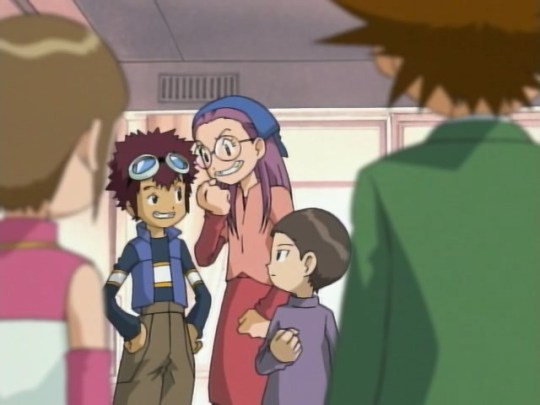
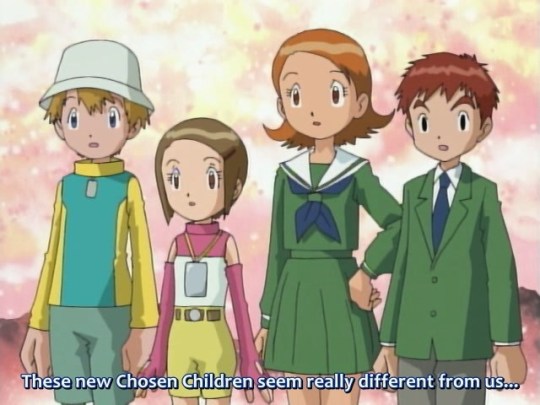
Having watched 02 in Japanese a few times and being very used to the core cast’s latter-half characterizations, rewatching the early episodes always strikes me really hard in the face with genuine shock at how shallow the kids -- especially Daisuke and Miyako -- start the series off as. It’s understandable in terms of the context of the series -- unlike the Adventure kids, who were thrown into a “survival, need to get home” situation off the bat and thus already understood the need to be wary, these kids started off having comparatively easy access to home at any time, and didn’t have a constant sense of danger and survival looming over their heads. It naturally took a lot of time for the gravity of the situation they were in to start really hitting them, and so even the relatively straight-laced Iori didn’t exactly take it all that seriously at the beginning.
Yet while it took them a significantly more delayed time to understand what they were dealing with and take it as seriously as they needed to...they started cultivating something else in the meantime.
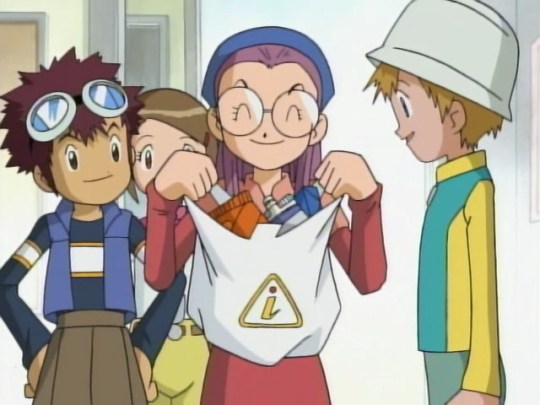
02′s first half is especially full of “random banter conversations” that seemingly involve nothing in particular, but, in fact, that’s actually part of the point. One thing I have always been quick to point out in regards to 02 is that it is rather unique among Digimon series in how it goes out of its way to portray its core cast as having become friends even in pure daily-life social friend terms, even if it had absolutely nothing to do with Digimon incidents -- these are kids who genuinely enjoy each other’s company even in the most mundane of situations. This was something that wasn’t the case for the original Adventure kids -- having been a group of kids thrown together by necessity, even though they most certainly kept in touch and trusted each other as fellow Chosen Children deeply, they started floating back into their own different social clusters after the events of 1999. Relationships are multifaceted, after all; you can still have a deep relationship and bond without necessarily being friends on a social level.
But already, off the bat, Miyako brings food for her new best friends, and it’s implied that she’s the main ringleader behind holding the picnic -- a picnic that started off having no intended relation to the Digital World territory war -- in episode 6. And, to be quite honest, can you really blame these kids? Even the Adventure kids wistfully entertained the idea of a long-term fun adventure through the Digital World in Adventure episode 54, wanting to enjoy its beauty and fun in a situation where they weren’t constantly running for their lives. Now that this luxury is actually available, why not take advantage of it -- and bond further with the others in the process? And for the rest of the year, these kids actively end up spending mundane conversations together and bonding to the point that, by the time we get to the end of 02, these kids have just genuinely bonded so much that they really come off as a cohesive, inseparable unit that would actively choose to spend time with each other if given the opportunity. In fact, even going through all of the TV Digimon series that exist as of this writing, I would say Appmon is the only one that really competes with 02 in portraying its core cast in this manner.
Again, remember: this is a series where characterization is dependent on how the kids treat others and interact with them, so you do actually have to pay close attention to these interactions and see how they change over the course of the series.
So once the episodes start coming in play, we actually learn a lot more about what happens when the characters start breaking away from their shallowness. For instance, episode 8, one of the first key episodes to understanding Daisuke’s character:
Daisuke: He'll be a great opponent. We didn't face off in the last tournament.
Takeru: If you had made it to the finals, you would have, right?
Daisuke: Don't remind me...
Hikari: Can you win?
Daisuke: It's not about winning or losing. Right now, all of the boys who play soccer in this country want to be like him. Just thinking about playing against him makes me excited!
For all Daisuke initially seems to be arrogant, he’s actually not that incapable of humility. Far from it, actually; he does have a genuine love for soccer and the spirit of the game, and, when completely and obviously unmatched, fully admits he has no chance and is set on enjoying the most he can out of it anyway. I feel like Daisuke’s surface-abrasive attitude really does throw off the fact that he’s a lot more genuinely humble than he’s given credit for. In the end, he’s satisfied enough with the accomplishment of pulling off one sliding tackle against Ken, and is able to enjoy that -- a foreshadowing of how the latter half relies so much on the fact that he’s capable of enjoying simple pleasures and being straightforward about them.

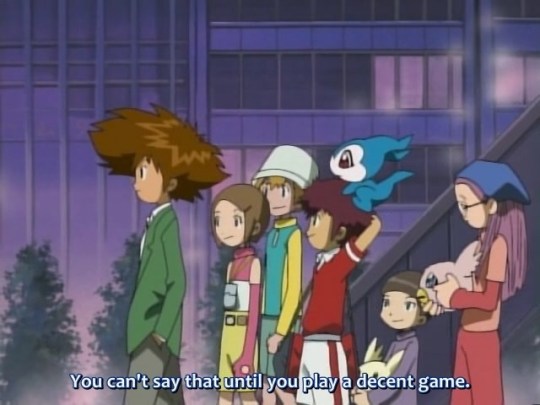
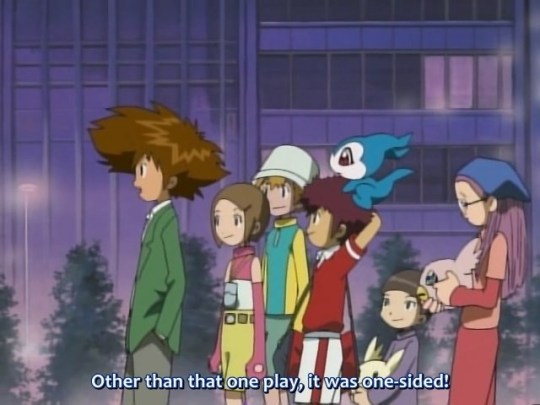
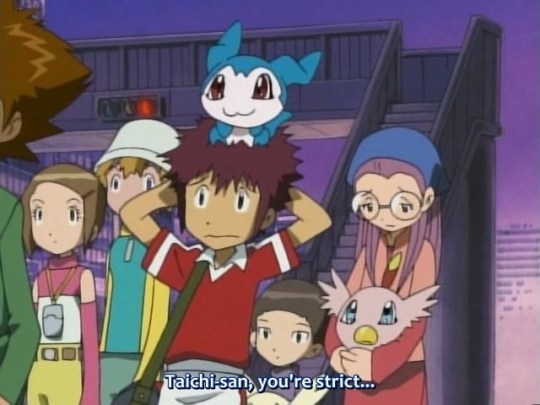
I find that this scene is really underappreciated, too (mainly because it gets lost in all of the other major things in this episode) -- while Daisuke jokes about his accomplishment, it only takes a single comment from his respected senior Taichi to shut him down.
There’s a huge reason I constantly emphasize that Daisuke respects his elders -- this part tends to get lost in translation a lot (especially the American English dub, which just smashed this aspect out of him wholesale, among other things) due to it being a bit reliant on Asian senior deference and cultural propriety, but Daisuke is respectful not only out of societal obligation but also because he genuinely respects his elders! The way he looks up to Taichi and chases after his approval is genuine, and even his interactions with the other Adventure kids have a major hint of him having genuine respect and deference to them. Daisuke is just a deferential person in general -- note that while his crush on Hikari tends to manifest when he’s at his most shallow, he’s actually the one putting Hikari on a pedestal (considering it his own responsibility to impress her), so he’s not actually as assertive as he tries to come off as. The first half of 02 arguably has him deflating more often than he actually stands his ground...and this is a trait of him that starts to actually change quite a bit over the course of the series.
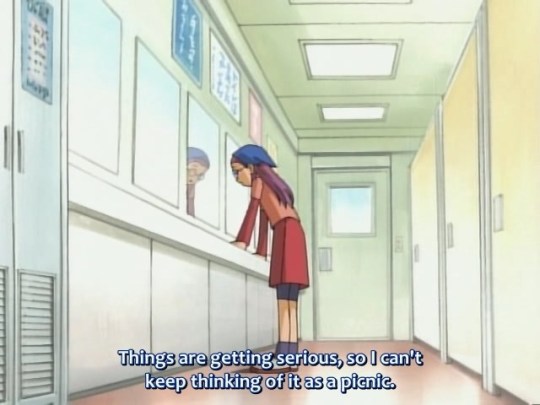
Miyako comes to terms with the fact that maybe she’d been taking this whole Digital World adventure thing too lightly in episode 10, indicating that she actually does have a good sense of priorities when they become increasingly clear! This is actually very important, because it fleshes her out as someone who’s emotionally sensitive -- too emotionally sensitive, to the point that “emotional sensitivity” is just as much of a driving point behind her later breakdown in episode 18, this time from taking her duties too seriously. Miyako is a very id-driven person, and so a lot of the early series is her struggling to find a proper balance on how to adjust her emotions in an increasingly escalating situation. Her heart is in the right place, she’s just not someone with an inherent sense of preparedness to deal with this kind of problem.
We get into the secondary Digimental arc, and there’s a noticeable consistent thread that all of them involve admission of personal faults. This is something that tends to throw people off at times -- wait, having bad traits about yourself is what awards you? -- but the point is that this isn’t like Adventure’s Crests, where things came from proof of exercising the virtue, but rather admitting that there are ways you need to improve, and showing a will to improve in that manner. In the end, people are not perfect human beings, and sometimes even understanding that you’re deficient is half the battle -- after all, the second half is all about a certain character named Ichijouji Ken coming to terms with some very, very serious personal problems.
In episode 11, Daisuke completely admits that he doesn’t feel he understands the concept of friendship the way Taichi and Yamato et al. see it, also latently admitting that he doesn’t see himself as worthy of the Digimental of Friendship. Beyond betraying a lot deeper issues within Daisuke that he seems to have actually had a background lacking in friends and sources of validation, he actually acts very self-effacing when admitting his issues to Taichi and Yamato, ultimately culminating in him calling himself pathetic. Or, in other words, he does want to be a better friend and to understand the concept better, and is harsh on himself for not doing better (which, of course, ultimately leads to how he eventually does gain better relations with the rest of the group and reaches out to Ken).
In episode 14, Miyako admits that she’s shallow and judgmental and tends to jump to conclusions based on first impressions. Recall that she’s comparing herself to Mimi in said relevant scene -- Mimi, whom she admires, and actually spends part of the episode trying to understand and empathize with the mentality of. This is not a statement of Miyako being proud of herself. Rather, this is Miyako being very straightforward about the fact that she needs to try harder to see through the essence of things and to see through to the emotional core of. Again, something she actually does start developing over the course of the series.
In episode 16, Iori gets his first major lesson on the limitations of being too stuck on principles in his attempt to be honest. Recall that Iori’s later character arc is very dependent on him realizing that his own view of the world is too black-and-white. It’s great if you could never tell a lie to anyone, ever, but in the end, that’s going to reach limitations of practicality -- after all, as Jou points out, what Iori did ended up not actually hurting Jou in comparison to the incredible amount of hurt it would have caused everyone by being too stubborn, and thus Iori would have failed to keep his responsibility to help the others because of one narrow-minded principle.
Hikari even gets in a bit during the infamous episode 13, where we learn that her “passive” attitude is biting her in the rear. In Adventure, Hikari’s passiveness and reticence had mostly been used as satellite development for Taichi (his insecurities as an older brother and his obligations to her), so this is actually the first time we get to see a proper perspective from Hikari’s side, and it turns out that his overprotectiveness has actually caused her to get dependent. But even though Taichi is the one the episode actually focuses on, the larger focus is more specifically on the fact that Hikari is too passive -- that she sees being taken by the Dark Ocean as an inevitable thing that’s just going to happen unless someone else steps in on her behalf. Takeru, of course, is having none of it.
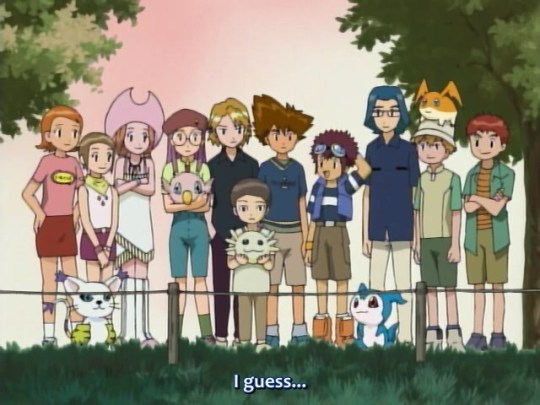
Once that’s out of the way, we go back to taking a look at the subtleties of everyone’s interactions. While everyone generally tends to focus on the second half of episode 17, it’s also pretty interesting to see how the 02 kids react to hearing about their seniors’ adventure in the first half -- remember that this is the first time the 02 kids are actually given any real depth about the degree of 1999′s events that’s not just random points of hearsay, and the way the new kids react to it indicates that they’re thoroughly floored. It’s later established that they didn’t even get the full story (it may not even be possible, given that the Adventure kids’ experiences may well have gone even further beyond what we got to see in 54 episodes), and yet the new kids are overwhelmed. 02 itself does not shy away from the fact that the younger kids really have no qualms about deferring to their seniors if need be, and treating them with utmost respect.
Another minor note, which I pointed out in my Daisuke meta earlier, is that the beginning of this episode is pretty much the last time Daisuke ever shows outright hostility towards Takeru for his relationship with Hikari -- it’s something you have to glean by squinting, but the implication is that the insecure and clingy Daisuke actually got to learn this episode that the two of them had a pre-established shared experience that he himself may not understand, and that it wasn’t just Takeru randomly swooping in and snatching away the closest thing he had to a friend for no good reason.
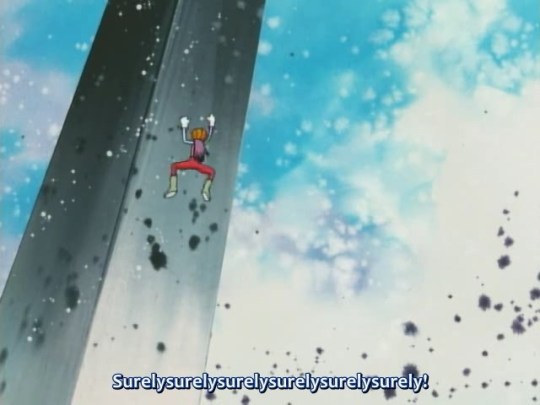
Once the Kaiser infiltration arc begins, episode 18 ends up being one of Miyako’s funniest episodes, but it’s a bit distressing that a lot of people in the fanbase often never let Miyako live this incident down, when in actuality this was explicitly not a good mental health day for her. (This is basically the equivalent of pinning Mimi as a conceited, self-centered jerk based on the fact she was one for a fashion in Adventure episode 25.) The beginning and ending of this episode establish that this is basically a result of Miyako...trying her hardest. She’s scared as hell, but she also learned in episode 10 that this is something she needs to take seriously, and the stress puts her into a mental breakdown. This is why she ends up having a heart-to-heart with Hawkmon at the end; her heart is in the right place, but she needs to find a way to channel her emotional sensitivity in a way that doesn’t make her into a complete mess.
And note that her own voice actress, Natsuki Rio, even pointed out that Hawkmon’s actions had enough of an influence on Miyako’s character that she had to play her differently thereafter.
At first I always played her with Maximum Excitement, and I kept thinking “someone, please, stop her,” but the more straight-laced Hawkmon did his best to pull her in and hold her by the reins (laughs). Thanks to him, Miyako became a lot more of a put-together person…thank goodness Hawkmon is her partner!
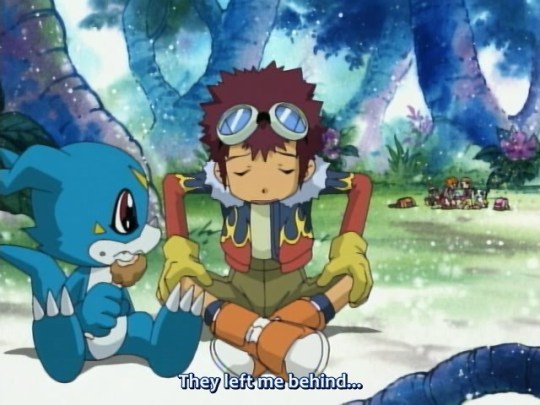
Episode 19 has two interesting things of note that I want to point out -- first of all, starting from the very beginning of the episode, everyone ditches Daisuke because they’re independently going in to infiltrate the Kaiser’s base. Note the complete lack of a plan here whatsoever -- everyone’s just going in on their own -- and the fact that everyone expects Daisuke to come up with what he wants to do on his own. For all it’s worth, even though Daisuke may have a designated protagonist aura to him, within the story itself...nobody actually sees him as a leader at this point in the series (and, to be fair, he’s never really tried to claim the position, either).
It’s similar to how Taichi was never recognized as a particular leader of the Adventure group until Adventure episode 28, but in regards to the full team dynamic, it’s actually inverse -- the Adventure kids were capable of making tactical plans together as early as episode 20, but fell apart emotionally in short order as soon as Taichi was gone, whereas here, the kids are fond enough of each other to hang out socially and support each other emotionally, but they take a while to get any real cohesiveness as a fighting group.
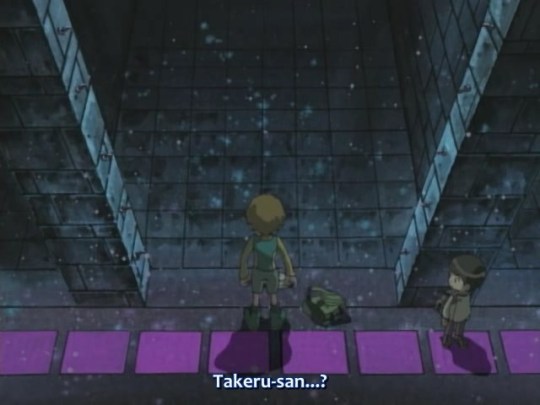
The other is that Iori personally witnesses Takeru’s sudden whiplash into his grudge against the darkness and the Kaiser, and it scares the hell out of him.
Takeru eventually laying a punch on the Kaiser is a pretty awesome moment (and, really, Ken kind of deserved it, so it’s hard to not cheer for him), but it’s also important to note that within the context of the series, this is not a good mental place for Takeru to be in. Iori, the person who should by all means sympathize with hatred of evil things at this point of the series, is still extremely unnerved by Takeru’s actions here, because he’d always seen Takeru as a mature person who’d always kept his composure, only to show a drastically different side of him that he hadn’t even shown a hint of before. That kind of “two-facedness” and emotional repression -- and this way of venting trauma in general -- cannot be good for Takeru at this point in time, and it’s also an important moment for Iori when he later admits during the two’s Jogress arc that he’s having a bit of a hard time understanding him.
And so episode 20 comes, and Chimeramon pretty much takes out the entire party, leading to this conversation.
Takeru: Let's escape.
Daisuke: Escape?
Takeru: We can't fight anymore. Our mission has failed. We'll retreat and wait for another chance.
Hikari: You're right. We have no other choice.
Iori: Understood.
Daisuke: No.
Miyako: Daisuke?
Daisuke: We can't just say "another chance" like that. If we leave now, they'll keep attacking anything in sight. We don't know if we'll be able to get into the fortress again. So this is our only chance!
Hikari: That's crazy...
Iori: Exactly!
Miyako: They're all back to their Baby forms...
Chibimon: Daisuke...
Daisuke: But...didn't you all see it? Destroying those towns...and all we could do was watch quietly. I don't want to see that ever again. I won't let them do whatever they want! So I'm going, even alone. I won't give up now. After getting this far, all I can do is go forward!
Why is this moment important? This is the first time Daisuke has actually stood a firm ground against anyone else in the party -- and not only that, with the entire party standing against him.
Recall that I mentioned earlier that, in spite of Daisuke’s abrasive attitude suggesting otherwise, he actually has a tendency to “deflate” pretty quickly when people tease or criticize him. He spends the first half of the series having a lot more bark than he actually has bite. Earlier in the series, if the entire party were to go against him, he’d be more likely to begrudgingly go along (while complaining) -- in fact, he actually did just that at the beginning of episode 7! But now that push has come to shove, Daisuke’s own sense of morals and bleeding heart have won out. (While his decision here is definitely a bit reckless, he does have a point; if they’d retreated, they might genuinely lose any future chances.) Even with the entire party telling him to pull back, he refuses to accept what they want him to do, and pushes forward.
This is where Daisuke first starts to really make strides towards what becomes his eventual major role in the group as “the one who pulls people forward”. It’s a moment after which the rest of the group themselves also start to treat him with more respect now that he’s proven he’s not just a doormat, and that when it comes to there being a real problem with real priorities, he does have the resolve and initiative to keep going.
Also, a very important point is that he immediately says he’ll go alone if he has to. He doesn’t begrudge the others for wanting to fall back, and has no condescension towards them; he just can’t stand the fact that he himself is being asked to sit it out.
So, you know. Episode 21 happens. Ichijouji Ken goes through some real trauma as Wormmon dies in his arms. And all Daisuke has to say is...
Daisuke: You should go home. There are people who are worried and waiting for you! Go home!
Remember when I pointed out that 02 takes a very unique perspective on Ken’s redemption arc, pointing out the futility of being too trapped in the idea of symbolic penance and focusing more on actively taking steps in the future to make up for and fix things? Here’s our first major sign of this, and Daisuke’s eventual approach to Ken -- Daisuke does not choose to scorn or lambast Ken for what he’s done, even though there are a lot of things Ken deserves to be harped on for, but rather instructs him to take the first active step towards fixing his mistakes, in this case fixing things with his family.
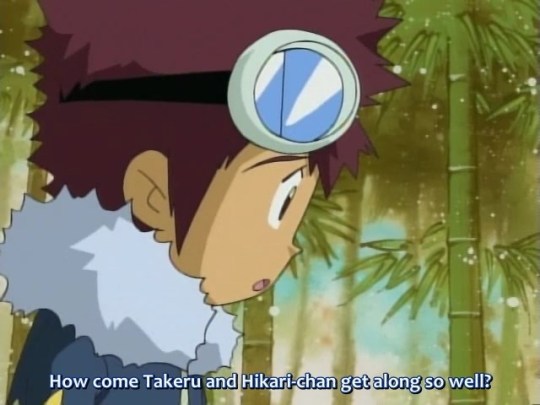
Episode 22 is Daisuke’s own “fanbase will never let him live this down” moment, but there’s still some interesting things to note here. Firstly, Daisuke’s “relapse” happening exactly when it seems like his duty to the Digital World is done and there’s nothing to do besides community service doesn’t seem coincidental, especially when this exact episode actually dedicates a full scene to Takeru, Hikari, and their partners going “...now what?” Secondly, as I touched on earlier, note that Daisuke’s never really seemed to have any resentment against Hikari for not responding to his affections -- in fact, he still considers it his own (and V-mon’s, by extension) duty to be the one to impress her. It’s a surprisingly refreshing take on the “shounen hero with a crush on a girl” trope, because in the end...Daisuke isn’t actually all that possessive of her, he just really wants validation from her, and respects her a lot.
More importantly, though -- note the way Daisuke handles this topic. He’s not actually mad at or resentful of Takeru anymore. In fact, he’s mulling on the topic and wondering what he could do to be on that level. Yup, even when Daisuke’s being shallow and jealous, he’s still learned to handle this issue ever so slightly more maturely than he would have at the beginning of the series.
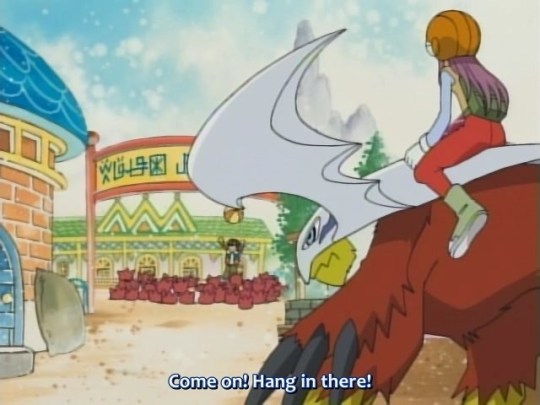
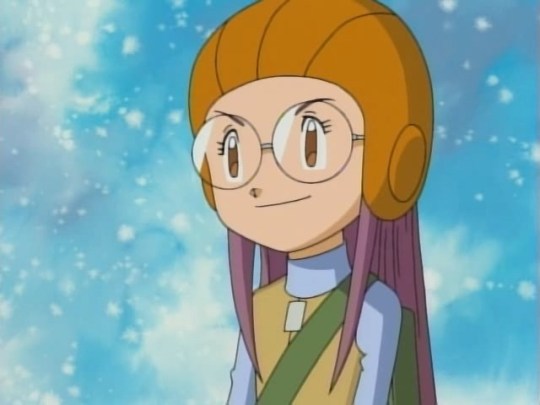
This is also important because only one episode later, once Daisuke becomes disappointed again at Takeru and Hikari walking off on their own, Miyako intervenes -- not only so that Takeru and Hikari can have their space, but also so that Daisuke can have some genuine fun and something to do. This is a very blink-and-you’ll-miss-it moment in episode 24, but it makes it very clear that Miyako was looking out for Daisuke’s welfare, too, and I think it’s very important in light of the events of the prior episode. Miyako, who had always been fumbling on what to do with her emotions, is starting to properly channel them into managing the dynamic between the team and checking in on how everyone’s doing, and that starts to guide her actions and relationships for the rest of the series.
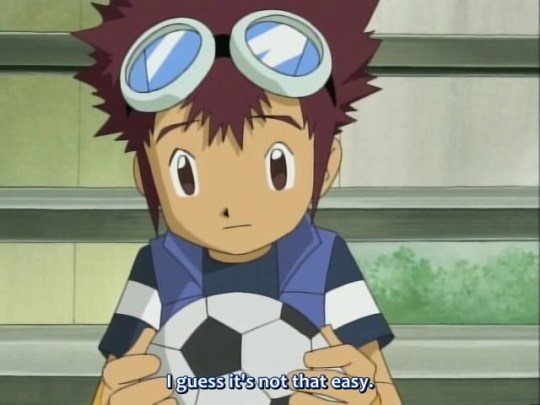
The next episode (25) is where we kick off not only the Jogress arc, but also the arc where we start going into everyone’s attitude towards Ichijouji Ken. This is important not only because Ken happens to be the effective central figure of 02′s story, but also because -- well, remember, 02 is fundamentally founded on the concept of relationships, so it’s only natural that the other kids’ relationship with the “team newcomer” will be a key aspect of the second half, and in relation to their own characters.
Remember how I said that Daisuke’s first-half character involved him being extremely deferential and often deflating whenever he was criticized or someone stood against him? At the time of episode 25, once again, pretty much the entire team is standing against him -- he’s the only one who’s this level of open-minded about getting Ken into the group, and everyone else is showing differing levels of opposition. But while Daisuke doesn’t begrudge the others for thinking this way, he also doesn’t back down, either, and reaches out to Ken on his own because he still really believes in what he’s doing. Now that he’s settled into what it means to be a Chosen Child, he’s started to gain a proper idea of what he wants to do, and what he feels needs to be done.
So, let’s recap everyone’s stances on Ichijouji Ken at the time of this episode!
Daisuke: Forward-thinking and optimistic; willing to believe that Ken should be given the chance to make up for his mistakes and that they should put everything behind him, even to the extent of believing that there’s probably a good reason for the more suspicious aspects about him (prior to the events of episode 25, it was unclear whether Ken was being a bit too callous about killing Digimon). Also the most actively aggressive in reaching out to Ken and trying to get him to join them.
Miyako: Forward-thinking; she openly states at the beginning of the episode that she thinks Ken’s learned his lesson, she’s just worried about whether he’s going to keep doing questionable things in the future (killing Digimon). Once it’s on the table that he’s not just doing this callously, she immediately is on board with him (to the point of even being the first in the group to use given name basis with him), but her stance on what to do with him is more on the edge of “give him space and wait for him to come on his own terms” (she ends the episode saying she’ll be waiting for him to come).
Takeru: States in the episode that he does believe that Ken’s changed, but doesn’t really know what he’s thinking (i.e. too inscrutable to really be sure about). The later episode 35 implies that Takeru was inclined to be a bit more sympathetic than you’d think otherwise, because he understands the trauma of losing a Digimon partner.
Hikari: Wants to wait a little longer and see how things play out. (Remember that Hikari has a known, consistent thread of taking a very passive approach towards things.)
Iori: Absolutely against it on sheer principle.
It should be noted that none of these stances are wrong. Iori sometimes gets a lot of flak for being the one with the most infamously cold stance towards Ken, but when you really think about it, Daisuke and Miyako are very lucky that their hunch about Ken was right and that he actually did happen to be a very kind boy who had a little too much trauma and some supernatural influence. The fact that Ken is a very emotionally withdrawn person for the rest of the series meant that the two of them ended up breaking through to him the most, but there’s nothing wrong with Takeru, Hikari, and Iori’s skepticism; Ken did some pretty shockingly horrible things in front of their eyes for the first half, and it’s entirely within their rights to determine how forgiving they want to be with him.
In any case, we get to episode 26 (the first Jogress), and most of that episode goes without saying, but I do want to emphasize Daisuke’s lines right before it happens.
Daisuke: If you die now, you won't be able to accomplish anything...I don't want that!
Ken: I don't want that...There are still many things I must do.
Daisuke urges Ken not to go for the “suicidal penance” route not only because it sucks, but also because, as symbolic as it may be, it’s also counterproductive to the whole point of doing penance to begin with. If Ken really wants to make up for his mistakes, he’s only going to be able to do that if he’s actually alive to do it! There’s only so much you can do by drowning in self-pity by going “because I did this, because I did that” instead of actually taking responsibility for your actions.
02 itself is deliberately ambiguous on how much Ken’s transformation into the Kaiser was Ken’s own conscious will and how much of it was Dark Seed-induced supernatural influence, but one thing it’s consistent about is that it doesn’t really matter. Regardless of what the cause was, Ken did what he did, and it’s his responsibility to make up for it, and the only way to actually do that is to keep moving forward. The fact that Daisuke is so able to viscerally and directly address what Ken needs the most right now is what fuels their first Jogress, and why Daisuke becomes Ken’s closest friend through the rest of the series.
People have pointed out that 02 has a lot of moments of physical hits, but, notably, other than Takeru punching the Kaiser in episode 19 (which he really deserved, honestly), all of these hits are done with the express intent of bringing the other person out of a very, very deep mental abyss (Yamato punching Taichi in episode 10, Daisuke slapping Ken in 26, Miyako slapping Ken in 30, and Miyako and Hikari’s mutual slaps in 31), because they were in a state where words would no longer reach them otherwise. These are all circumstances of the kind where the person on the receiving end understands that they really needed a drastic wake-up call because of how deeply they’d fallen (and these aren’t some average mental abyss problems these kids are getting put through, either). It’s actually hard to imagine any of the 02 group getting in the kind of genuinely angry and vicious fistfights Taichi and Yamato would in Adventure, because of how close they are (the closest being Daisuke and Takeru grappling in episode 11, but it never got near that level) -- in fact, these kinds of things are done with the implication that they’re doing it because they trust the other person to not hold it against them (and in fact, the fact Yamato does this with Taichi in this way is intended to be read as a sign of how much better they’ve come to understand each other).
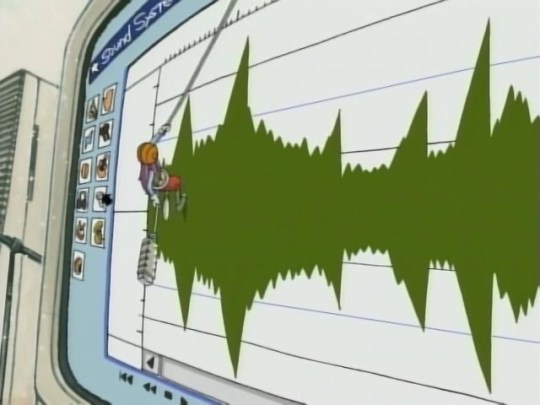
So, moving on with the series! The Giga House incident in episodes 28-29 is the first time the group works together in an organized effort, which is notable not only because it’s their first time coordinating with Ken, but also because it’s their first time properly coordinating at all. Remember when I mentioned that, back in episode 19, as much as the kids were pretty fond of each other and were great friends, they still hadn’t figured out how to actually fight as a team? Here we are, with them actually having started to figure that process out.
We then get to episode 30, where there’s actually quite a lot of interesting things to unpack.
Miyako: What's wrong with you?
Daisuke: E-Eh? Mi-Miyako-san?
Miyako: It feels weird when you add the "-san".
Daisuke: Shut up! Man, you're all the same!
Miyako and Daisuke’s relationship is often misconstrued considering that they’re the two most chaotic in the group (their temperaments are very similar at times, which causes them a lot of friction), but I also think this blink-and-you’ll-miss it moment is pretty much their actual relationship in a nutshell. They fight a lot, and they’re ostensibly vitriolic, but they’re actually two of the most like-minded in the group -- they banter because they’re comfortable with each other. Recall that I mentioned that Daisuke is normally respectful with his elders, yet he’s the only person in the group who won’t use the -san honorific on Miyako (even though she’s the oldest)...but the one time he gets flustered and uses it on her, she tells him that it’s weird and he needs to cut that out. Or, in other words, “it’s not like you to be weirdly respectful of me like that, we shouldn’t have that kind of distance between us, stop it.”
(It’s also pretty notable that Miyako has never seriously used -kun or any other honorific on Daisuke, even right after meeting him -- the only other person she dropped honorifics on was Iori, whom she’d known prior to the start of the series, but she seems to have deemed Daisuke enough of a fellow disaster child that he merited dropping it.)
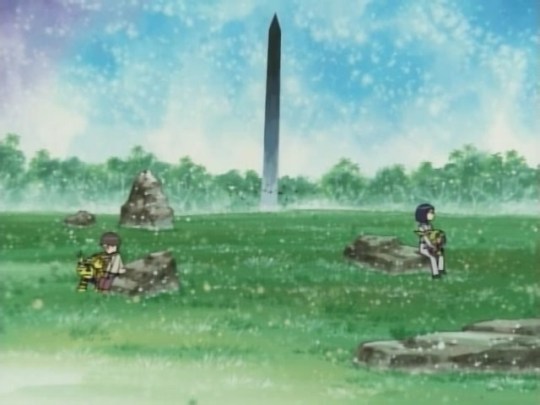
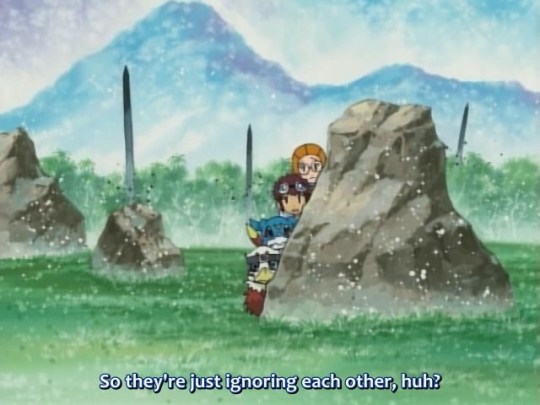
This is especially because, right after that, she recruits Daisuke into her plan to get Ken and Iori to get along -- in the end, when things really get serious, the two are incredibly like-minded (look at how in-sync they are when they scheme together).
30 is actually a surprisingly Miyako-centric episode, despite not ostensibly being one. For one, it says a lot that right now, her biggest priority is to get Ken and Iori to get along -- something that has absolutely nothing to do with herself. In episode 14, Miyako freely admitted that she had a tendency to jump to conclusions about people, and that she was shallow about aesthetics, but this is a very different Miyako from the one who harassed Daisuke for Ken’s autograph in episode 8, or immediately became distrusting of Digitamamon in episode 14. Instead, she’s simply just genuinely invested in seeing people she considers friends get along, and in a selfless manner -- one that has nothing to do with herself. She just really, really cares, a lot.
After all of the first-half hubbub of Miyako really having no idea of what to do with her emotions, the second half has her start channeling that energy into what’s always been one of her biggest strengths: checking on, connecting with, and caring about her friends. Daisuke may be an aggressive forward-thinker who can push everyone in the right direction, but unlike his predecessor Taichi, he doesn’t actually have particular charisma or leadership skills that can necessarily hold everyone together. In the absence of that ability, Miyako fills in for him, checking on the moods and feelings on everyone in the team and making sure everyone’s doing well. And that’s why she loses her temper and slaps Ken late in the episode -- because, really, she’s reached her limit on her “give him space” philosophy when he’s abusing it to be standoffish in a crisis situation, and, on top of that, she really, really did have a huge emotional investment in him.
Moving onto more Miyako in episode 31, her Jogress episode with Hikari, we get to see a little bit of the old emotionally compromised Miyako again, but -- much like the second Digimentals arc -- it involves the two of them acknowledging that both of them are not going about things the best way, and that there are things they can learn from the other.
Hikari: Miyako-san, you're a handful sometimes.
Miyako: I knew that's what you thought of me...
Hikari: But...I've always envied that.
Miyako: Huh?
Hikari: Because I can't be honest and say I'm scared or scream like you.
Miyako’s tendency to lose control emotionally results in her being insensitive much of the time, which she calls herself out on multiple times during the episode, and she can’t always be as “kind” as Hikari is -- but, on the flip side, her antics are something that can be a “light” (pun not intended) towards those who are falling in a bad mental state or into the darkness, and Hikari even acknowledges this when one of her trains of thought makes her break out into laughter. Miyako ultimately manages to get through to Hikari this way at the end of the episode, which results in a Jogress and mutual growth for both of them -- Miyako puts more thought into how to approach others (it’s pointed out at the end that she’s still thinking about understanding Ken and Hikari better), and Hikari gains more resolve and determination to fight against things instead of passively accepting her fate (she tells Takeru very directly at the end "I’m fine now. I’ll never go there again.”).
Iori and Takeru's Jogress is a little more complicated to the point where it spans multiple episodes, but a lot of it ends up having to do with the fact that the events of the BlackWarGreymon arc start really putting Iori's black-and-white principles into conflict -- it's wrong to kill something that's been proven to be alive, but it's also wrong to be evil. Putting a huge nail in that is that there's a stake in him forming a relationship with Takeru, but he doesn't really understand Takeru either -- the "two-facedness" he witnessed back in episode 19 scares even him, and he's so intimidated by Takeru that, in episode 35, he goes to approach Yamato about Takeru's past instead of asking the person directly. Takeru, hearing about this, complains that he could have just asked directly, but admits he understands why Iori did so.
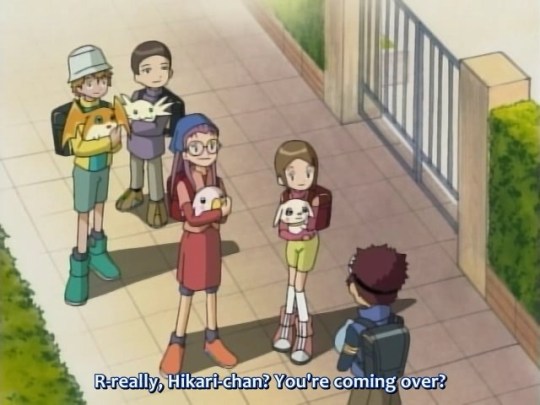
By the way, I should point out that episode 35 is the last time within the TV series that Daisuke is portrayed as having a particular interest in Hikari, and it’s just in terms of being slightly more excited that Hikari is joining his meeting. At this point, there are actual important things happening in the Digital World, and he needs to take care of Ken, too, and so...in the end, once again, Daisuke proves that he’s actually capable of putting aside those kinds of more shallow things when he really needs to.
On top of that, this is when the kids start actively working with Ken in the real world (and, if post-02 materials are any indication, continue to hang out with him even for social outings). The choice to have Ken live in Tamachi instead of Odaiba facilitated his isolation from the group during the Kaiser arc, and during around the third quarter they were all grouping up in the Digital World anyway, but the fourth quarter actually has the kids make an attempt to include Ken in their real-world outings despite the distance. Tamachi is not temporally far from Odaiba (approximately half an hour by train), but it’s a bit of a nuisance to get to, requiring crossing a bridge to/from the Tokyo mainland and paying extra for the Yurikamome. But at this point, he’s an important enough friend to them -- and them important enough friends to him -- that they’ll make it work.
At the end of episode 35, Iori finally decides -- to the point of recklessness, something that would have been previously very uncharacteristic of him -- to try and appeal directly to BlackWarGreymon to get him to stop destroying the Holy Stones so that they won’t have to fight. It’s emblematic of Iori’s heart being genuinely torn, because he’s having such a difficult time rationalizing all of these conflicting feelings. This comes to a head in episode 36, when Iori loses his temper at the rest of the group for “playing around”, but Armadimon snaps him back to reality to remind him that they’re tired and hungry, and this can’t be neglected. Iori himself ultimately becomes the one to proactively suggest that they take time to sit down and eat, indicating that -- little by little -- he’s starting to shift his thinking a bit, after being so incredibly stubborn for much of the series.
This is what leads to Iori and Takeru’s Jogress at the end of the episode, now that Iori is flexible enough in thinking to understand the emotional id behind Takeru’s mentality. And likewise, Takeru’s started to loosen up by 36, too --
Takeru: Sure, darkness is frightening, and we would feel at ease if we could get rid of it completely, but I'm sure that's impossible.
Ken: Impossible?
Takeru: Where there's light, there's always darkness.
Hikari: The brighter the light, the darker the shadow, right?
Takeru: Yes. That's why I think it's important not to lose sight of the light inside you, no matter how dark it is.
The thing about Takeru is that while he deceptively seemed more open and playful than Hikari for most of the series, he was actually bottling up a lot of emotions in a way not entirely different from the way she did. (Note how, despite how tied at the hip the two constantly are, they almost never actually talk about their thoughts on each other; it feels like a relationship where they implicitly trust each other but are practically reliant on that implicit trust to maintain that close of a friendship at all.) And he’s been keeping those emotions bottled up until they exploded in less-than-healthy ways, initially distancing himself from Iori. But being a lot more open about his thoughts on the matter allowed them to connect better, and eventually Takeru came to embrace a somewhat more reasonable stance on the matter after observing Iori.
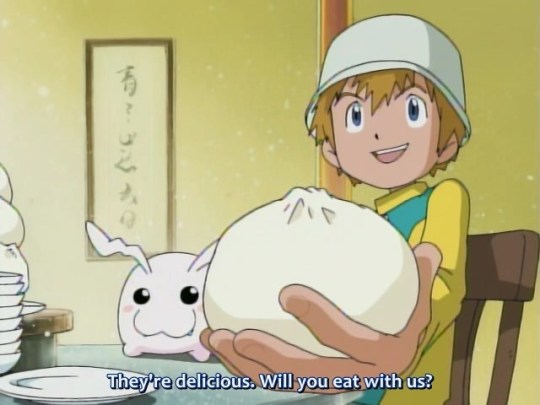
It also doesn’t seem like coincidence that this is the episode that ends with Takeru’s first major act of goodwill towards Ken.
This leads into episode 38, the Christmas episode. Fun things to note!
The episode opens with Daisuke and the other younger kids giving a “Christmas present” to their seniors in the form of letting them reunite with their partners. Remember how I said that the 02 kids always admired their seniors and looked up to them? Even this late in the series, the series does not shy away from the fact you’re supposed to see the 02 kids as their deferential juniors.
The Christmas party is, of course, notably, the first major moment of reconciliation between Iori and Ken, with Iori having gone through major harsh lessons about morality in the last few episodes, and Ken opening up more to the rest of the group. Said party is also yet another notable example of how much of a priority it is for the 02 kids to be “social life friends” and not just friends working as a Digimon incident team -- after all, having genuinely emotionally present friends is what Ken needs most in his life right now, considering that the party is treated as the first time he’s been truly happy in a long while.
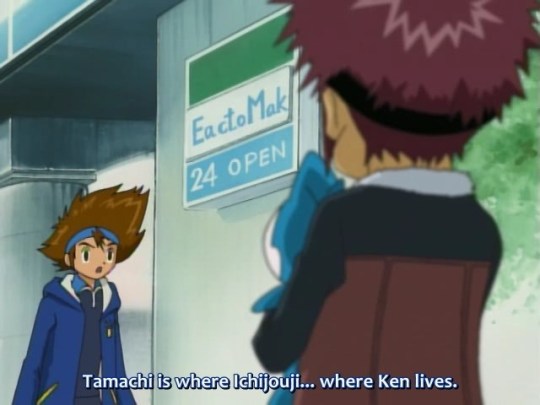
This is followed by episode 39, which is notable as the time when Daisuke finally commits to switching to given-name basis for Ken, and actually opens the episode standing against Taichi -- because he's so worried about Ken that he needs to go join him. This is something that's lost a bit in translation, but although Daisuke stands down against Taichi, he's not rude nor does he overstep his boundaries with his respected senior (he even opens his statement in polite-form Japanese) -- he's just saying, firmly and politely, "I'm sorry, but I can't go, I have to go help my friend." It’s a notable moment because while Daisuke has been becoming increasingly assertive and aware of what he really wants to do, this is the first time we’re actually seeing him refuse to defer to the very senior he’d spent so much of the series idolizing and looking up to.
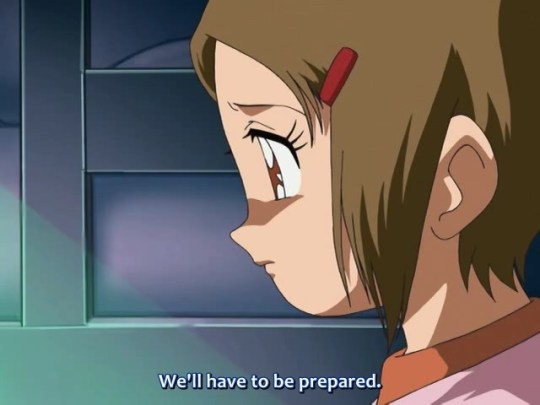
We get to episodes 43-45 (the Demon mini-arc), which is also the culmination of the 02 kids having to face the limits of pacifism. This tends to throw off people who are coming in from Adventure, since the Adventure kids ended up killing Digimon with a lot more ease in the original series, but it’s also important to make note of the fact that the episode itself deliberately portrays a gap in mentality between the Adventure and the 02 kids -- with Hikari torn between the two. It also creates an interesting subversion of expectations when Hikari, the one you’d expect to be more on the pacifist side, is the one who’s already accepted that it may be inevitable, whereas Miyako, the more aggressive and belligerent one, is the one staunchly against it.
The reason for this “paradox” comes out of a single line from Hikari in episode 44:
Hikari: You’re the one who saved him, Miyako-san.
The Adventure kids never liked killing. They were never enthusiastic about it -- it was just that they were almost immediately put in a situation where the entire fate of the multiverse was at stake thanks to some unambiguously evil Digimon who wanted nothing but wanton destruction. Even then, it was pretty clear that they never enjoyed it -- Takeru professed a desire to avoid fighting in Adventure episode 12, and the pacifist Mimi went through a breakdown in Adventure episodes 45-50 trying to avoid casualties. But one of the most important lessons Mimi learned at the time was that pacifism has its limits -- there’s no point if it ends up in more deaths than it saves, because at that point you’re adhering to moralistic principles more than you’re actually saving lives.
The fact that the Adventure kids and the 02 kids have a “different mentality” isn’t just happenstance, but outright embraced. Daisuke, Miyako, and Iori never had to actually deal with a conscious Digimon that was unambiguously evil for most of the series, and Archnemon revealing that her motives were pretty much nothing but wanton destruction in episode 29 was the first major warning signal to Iori that his pacifism might have limits. And during this Demon mini-arc, it’s not like these Digimon are threatening multiverse destruction or anything -- it really does seem like a constant “glimmer of hope” that maybe, just maybe, they can save people non-lethally. Alas, they can’t.
Daisuke, being someone who’s inherently practical-minded, starts entertaining the idea that push may come to shove as early as episode 25, and finally makes his first statement about practical limits in episode 43. But the more emotionally caught-up Miyako and Iori end up taking another episode to swallow it, and they don’t take it well. Most of the attention in 44 is given to Miyako, and it reconfirms that, despite her aggressive exterior, she’s emotionally sensitive and empathetic -- and while killing LadyDevimon is framed as truly the only thing that could have been done in that situation, Miyako is not faulted for being emotionally compromised, nor is Iori likewise when he faces a similar situation with Takeru and is forced to confront the people whose lives were at stake.
Episode 45, when Ken opens the gate to the Dark Ocean, doesn’t really have much to add on top of what’s already there, but this is basically “the point of no return” when everyone confirms their own emotional investment in Ken and understanding that he’s not just reformed, he’s genuinely struggling under the pain of what’s been happening -- and this is before they find out about the truth behind the Dark Seeds, and that Ken’s transformation into the Kaiser may have been supernaturally influenced, too.
It’s also interesting to see the different ways each kid reacts to Ken as they support him:
Hikari, the most outwardly compassionate, goes to support him the second she notices him in physical pain; Takeru notices that it might work, realizes Ken needs the support, and joins.
Iori and Miyako reflect on how Ken’s putting all of his efforts in, and lambast themselves before joining. Interestingly, given the circumstances behind what’s happened up until now, Iori and Miyako criticizing themselves take a different meaning -- Iori, who’d been scornful of Ken until recently, seems to be regretting that he distrusted him when Ken had been trying so hard, while Miyako, who had been open to him since episode 25, seems to be upset that she’s sitting there and not doing enough when he’s in all of this pain.
And Daisuke, of course, the most “forward-thinking” of them all, gives Ken a speech about what he’s done so far and reminds him that he’s already done more than enough for “atonement” -- which is, of course, what directly reaches Ken the most.
And when we get to episode 46, and the kids, now knowing about the Dark Seeds, hold a roundtable (and emotional support group) to discuss what to do about the Dark Seeds, Daisuke’s the one with the most spirit and energy about it, but...
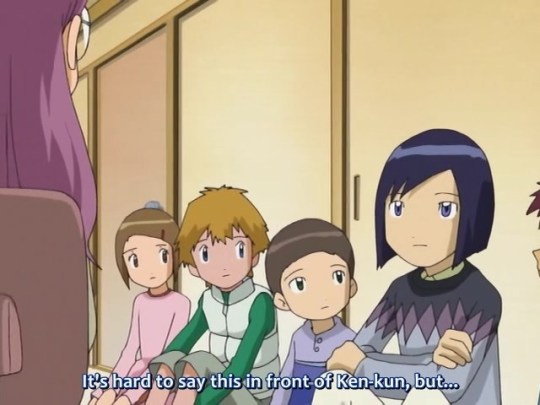
...the one actually leading the roundtable? Miyako.
Miyako: Sorry, that's all I can think of.
Ken: Please don't worry about me.
Miyako: (nods)
It’s subtle, but the scene in question does actually make a deliberate move in indicating that Miyako’s continuing to channel her emotional sensitivity and desire to go out of her way to help Ken -- of course, they all know how traumatic this is for him, but she’s the one who’s actively calling attention to how he must feel about it first and foremost.
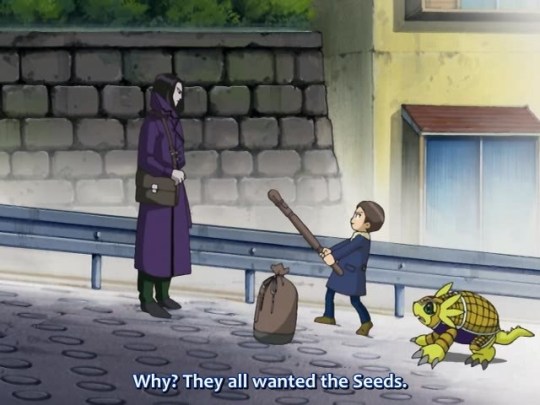
Episodes 47 and after end up becoming yet another major wake-up call for Iori (seriously, I do not understand why people claim he had no character arc when this wasn’t even remotely subtle) when he learns that Oikawa, whom he’d pinned as “evil”, has a deep relationship with the father he’d grown up idolizing so much, and it completely flips his world around -- even though he had started to get a bit more open-minded, he’s still trying to rationalize what should have been, in his mind, two diametrically opposite things. It fuels his confusion and desperate desire to understand more, not just about Oikawa, but about everything he’d thought about morality and why people turn to evil.
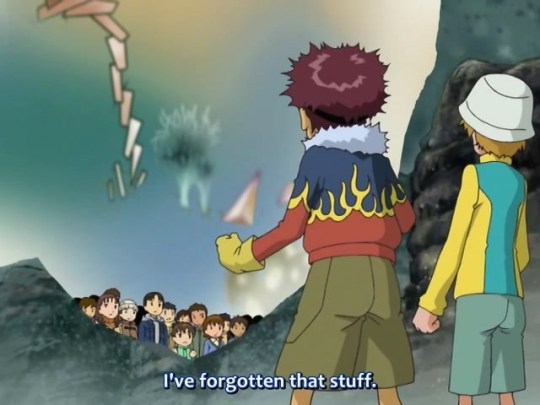
So we get to the final arc of the series, and it involves a confrontation with BelialVamdemon -- but said finale is heavily dependent on talking to the Dark Seed children and inspiring hope back into them. This results in a conversation where everyone talks about their career dreams, and Daisuke admits that he wants to be...a ramen chef, which completely blindsides even his friends.
What’s with this arc?, you might think. And moreover, why is Daisuke ending the series still kind of an idiot? Even Miyako still seems to be a bit of a mess and chaotic. Weren’t they supposed to be growing into dignified heroes, like Taichi and his friends were last series?
Well, here’s the thing -- the fact that the 02 kids end the series comparatively “undignified” is actually very inherent to the core theme of 02 itself. There were more than enough episodes that established that said kids are heroic in their own way -- caring about others, fighting on others’ behalf, and learning important lessons about what’s important to fight about. That doesn’t mean they don’t get the right to continue being disaster children while they’re at it.
Why?
Let’s look at a few official statements behind the creation and intent behind 02 as a series. From producer Seki Hiromi, from the Digimon Animation Chronicle:
That came from an idea I had while reading a newspaper article. I read a story about a nine-year-old boy going to Columbia University, and I thought, “This boy is going to college because he’s considered a genius, and everyone around him will be in their twenties, and he won’t get to have any friends his age. What kind of life would this boy end up having?”
Or some very interesting statements from head writer Yoshimura Genki from the 02 Blu-ray box:
When I was writing Ken Ichijouji, the main idea for him I used as a basis was the conflict between “the self that has to be a well-behaved child when adults are watching” and “being able to be oneself”, and the pain that came from it as a result.
So for instance, in the same way as the Pinnocchio fairytale, or the short story A.I. that was adapted into a movie, or many other works, there are probably universal worries that all children feel as they grow, but also, there were ongoing unimaginable, atrocious incidents happening with children at the time, and perhaps it was those social conditions that gave me a hint on what to do. I think I had some thoughts that I wanted to convey to the children who were living through that time.
I was given the opportunity to put those kinds of feelings, as much as I liked, into episode 23, and I am truly grateful to all of the staff, including the director.
...
Also, this is about Daisuke’s character, but I believe I paid particular attention to making him “a child who could be himself”.
He has no special talents, and although he’s clumsy and scatterbrained, I wanted him to be someone whose strength was in his straightforwardness, and wrote him that way.
Lying underneath the entirety of 02 itself is a theme about “children who are not allowed to be children”. Or, in other words, the pressure placed on children to be “talented” and “dignified” and “well-behaved”, often imposed on them by well-meaning parents who are unfortunately taking the opportunity to stroke their own ego, robbing them of the happiness and mental freedoms they should have as kids.
Ichijouji Osamu and Ken, who were placed under the pressure to be “genius children” and cracked under the pressure to please their parents. Oikawa Yukio, who was cut off from the Digital World in childhood by a well-meaning Hida Chikara, worried about his son getting into “foolish” talk. The Dark Seed children, who also fell victim to similar pressures that Ken did, and lost hope for life unless they could force themselves into that mold.
Takeru: If you want the Digimon to exist, if you believe in that, they will. Just like our feelings...Just like every child having the power to make their dreams come true.
Keiko: That's just childish.
Daisuke: You all have dreams for the future, don't you?
Noriko: Dreams for the future?
Takashi: I've forgotten that stuff.
Daisuke: No way! You must have one!
Takeru: It's nothing to be ashamed of.
Takashi: Then, what's your dream?
Daisuke: Mine? Mine's a ramen shop. I love ramen! I'll become the world's best ramen maker!
Ken: I had no idea...
Noriko: Well...actually, I wanted to be a kindergarten teacher.
Hikari: Me too.
Daisuke: What about you guys?
Takashi: A baseball player!
Keiko: I really want to be a pastry chef.
Hiroshi: When I said I wanted to be a manga artist, everyone laughed, so I gave up...
Takashi: We all had aspirations, and at some point we thought that wasn't allowed...But we were wrong, right?
Daisuke: Let people say whatever they want!
Noriko: You're right, we should be free to dream.
Miyako: Not just dreaming. If you work hard, your dreams will surely come true!
Notice something about all of these careers mentioned? They’re all the kind of “overly childish” “wild dream” “undignified” “too simple” kinds of dreams that an average parent might be uncomfortably quick to shoot down because that’s “not good enough”. These are the kids who willingly accepted the Dark Seeds; they, much like Ken, probably grew up under parents who prioritized school performance and other “societally dignified” things that ended up eating away at their happiness.
02 has a lot of different themes, but the one that lies in its undercurrent from start to finish is “so why does a child have to be this way? As long as they still understand what’s important, do they have to be dignified people? Why can’t they just be free to have dreams and be themselves?” And Daisuke and his friends are there specifically to stand up against this mentality, and to remind Ken and the other victims of it that it doesn’t have to be this way -- that it’s okay to be your true self, and be a child, and not succumb to all of those arbitrary, shallow standards people put on you. Even if that means you’re still a bit of a chaotic disaster at the tender age of eleven.
Digimon, in the Adventure and 02 universe, have always been treated like a part of the self (they were literally conceived as a physical manifestation of the soul), but in 02 they gain an extra meaning of representing “the inner, deepest part of yourself that represents your wildest ‘childish’ dreams”. The symbolism of Ken spending the first half of the series trying to reject Wormmon for being “weak” -- in other words, rejecting his own kind-hearted self for not being the kind of “strong” entity he was pressured and groomed into being -- is not lost, nor that of the Dark Seed children gaining partners when they reconnect with their dreams and wishes, nor Oikawa finally, finally meeting his partner when he comes into contact with the past he’d really lost (and especially not the fact that his attempt to reclaim shallow reminders of said childhood involved trying to make his own Digimon).
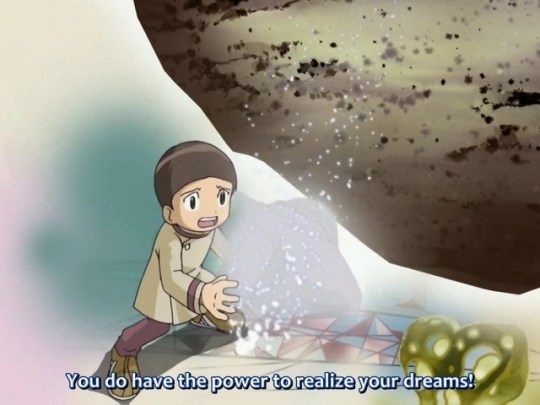
And notably, the series’s finale (prior to the epilogue) ends not on Daisuke but on Iori, escorting Oikawa to the Digital World despite how completely impossible it would have been for early-series Iori to even entertain the idea, finally coming to truly understand what happened with him and being most personally impacted by his death.
But in any case, where are we with the characters? We’re here to talk about how they’ve grown and developed over the course of the series. Let’s recap:
Daisuke: Started off the series as an abrasive kid with more bark than actual bite, constantly deferring to others and easily deflating, relying on shallow sources of validation like wanting attention from Hikari; gradually gained an ability to identify what was important and put his foot down for it, embraced his forward-thinkingness to reach out to a heavily troubled child as a friend, and ended up surrounded by a friend group that loves and respects him.
Miyako: Started off the series as a shallow, flighty girl with poor control over her emotions and difficulty in appreciating the gravity of things; came to channel her emotional range into empathy for others and compassion, bringing other people together and taking care of them.
Iori: Started off the series as a straight-laced but too principled child who stuck to “rules of what’s right” not only in morality but also in way of acting; started to appreciate the emotional nuances and heart behind why people do what they do and how it’s possible to be more flexible in “doing good”.
Ken: Well, his character arc is pretty obvious, but -- again, while his arc of learning to forgive himself is well-known, less often pointed out is that it centers very heavily on not only having penance but also not being too hung up on the past, and the futility of drowning in self-pity and regret instead of choosing to take responsibility and act more productively going forward.
Takeru: Started off the series as a seemingly mature but deceptively inscrutable character whose duality made him hard to approach; eventually opened up with the help of others and showed a capacity for being more flexible with his personal grudges.
Hikari: Started off the series emotionally repressive and passive to the point of self-destruction; eventually embraced connections with her other friends and became more active in taking a stand for herself.
Hey, not bad!
And, again, this is not a series you should be reading in terms of “self-awareness” in the same way Adventure was, but in the sense of their “relationships” and how they interact with others. By being less abrasive and more assertive, Daisuke gained the respect of his other friends. By putting her emotional capacity into caring about others, Miyako became someone who holds the group together. By learning to think a little more flexibly and be less stubborn, Iori arrived at a position where he could more easily sympathize with others in the group. Takeru and Hikari both moved from their previously relatively inscrutable positions to ones who could more effectively interact with and open up to others. And Ken, of course, became someone who managed to integrate himself into a group of true “friends” despite everything he had done against them in the first half.
This, in the end, is how you get what’s one of the tightest friend groups in Digimon history. In the end, the relationships themselves are almost like characters of their own that got development -- I say very often that you could take two of the characters and have an excellent scope of how they’d interact and play off each other by the end of the series. And although they end the series as possibly one of the most shameless, undignified disaster groups out there...they’re certainly still heroic, and in any case, given the lessons they learned throughout their own series, they probably wouldn’t have it any other way.
248 notes
·
View notes
Text
january reading
why does january always feel like it’s 3 months long. anyway here’s what i read in january, feat. poison experts with ocd, ants in your brain, old bolsheviks getting purged, and mountweazels.
city of lies, sam hawke (poison wars #1)
this is a perfectly nice fantasy novel about jovan, who serves as essentially a secret guard against poisoning for his city state’s heir and is forced to step up when his uncle (also a secret poison guard) and the ruler are both killed by an unknown poison AND also the city is suddenly under a very creepy siege (are these events related? who knows!) this is all very fine & entertaining & there are some fun ideas, but also... the main character has ocd and SAME HAT SAME HAT. also like the idea of having a very important, secret and potentially fatal job that requires you to painstakingly test everything the ruler/heir is consuming WHILE HAVING OCD is like... such a deliciously sadistic concept. amazing. 3/5
my heart hemmed in, marie ndiaye (translated from french by jordan stump)
a strange horror-ish tale in which two married teachers, bastions of upper-middle-class respectability and taste, suddenly find themselves utterly despised by everyone around them, escalating until the husband is seriously injured. through several very unexpected twists, it becomes clear that the couple’s own contempt for anyone not fitting into their world and especially nadia’s hostility and shame about her (implied to be northern african) ancestry is the reason for their pariah status. disturbing, surprising, FUCKED UP IF TRUE (looking back, i no longer really know what i mean by that). 4/5
xenogenesis trilogy (dawn/adulthood rites/imago), octavia e. butler
octavia butler is incapable of writing anything uninteresting and while i don’t always completely vibe with her stuff, it’s always fascinating & thought-provoking. this series combines some of her favourite topics (genetic manipulation, alien/human reproduction, what is humanity) into a tale of an alien species, the oankali, saving some human survivors from the apocalypse and beginning a gene-trading project with them, integrating them into their reproductive system and creating mixed/’construct’ generations with traits from both species. and like, to me, this was uncomfortably into the biology = destiny thing & didn’t really question the oankali assertion that humans were genetically doomed to hierarchical behaviour & aggression (& also weirdly straight for a book about an alien species with 3 genders that engages in 5-partner-reproduction with humans), so that angle fell flat for me for the most part, altho i suppose i do agree that embracing change, even change that comes at a cost, is better than clinging to an unsustainable (& potentially destructive) purity. where i think the series is most interesting is in its exploration of consent and in how far consent is possible in extremely one-sided power dynamics (curiously, while the oankali condemn and seem to lack the human drive for hierarchy, they find it very easy to abuse their position of power & violate boundaries & never question the morality of this. in this, the first book, focusing on a human survivor first encountering the oankali and learning of their project, is the most interesting, as lilith as a human most explicitly struggles with her position - would her consent be meaningful? can she even consent when there is a kind of biochemical dependence between humans and their alien mates? the other two books, told from the perspectives of lilith’s constructed/mixed children, continue discussing themes of consent, autonomy and power dynamics, but i found them less interesting the further they moved from human perspectives. on the whole: 2.5/5
love & other thought experiments, sophie ward
man, we love a pierre menard reference. anyway. this is a novel in stories, each based (loosely) on a thought experiment, about (loosely) a lesbian couple and their son arthur, illness and grief, parenthood, love, consciousness and perception, alternative universes, and having an ant in your brain. it is thoroughly delightful & clever, but goes for warmth and humanity (or ant-ity) over intellectual games (surprising given that it is all about thought experiments - but while they are a nice structuring device i don’t think they add all that much). i haven’t entirely worked out my feelings about the ending and it’s hard to discuss anyway given the twists and turns this takes, but it's a whole lot of fun. 4/5
a general theory of oblivion, josé eduardo agualusa (tr. from portuguese by daniel hahn)
interesting little novel(la) set in angola during and after the struggle for independence, in which a portuguese woman, ludo, with extreme agoraphobia walls herself into her apartment to avoid the violence and chaos (but also just... bc she has agoraphobia) with a involving a bunch of much more active characters and how they are connected to her to various degrees. i didn’t like the sideplot quite as much as ludo’s isolation in her walled-in flat with her dog, catching pigeons on the balcony and writing on the walls. 3/5
cassandra at the wedding, dorothy baker
phd student cassandra returns home attend (sabotage) her twin sister judith’s wedding to a young doctor whose name she refuses to remember, believing that her sister secretly wants out. cass is a mess, and as a shift to judith’s perspective reveals, definitely wrong about what judith wants and maybe a little delusional, but also a ridiculously compelling narrator, the brilliant but troubled contrast to judith’s safer conventionality. on the whole, cassandra’s narrative voice is the strongest feature of a book i otherwise found a bit slow & a bit heavy on the quirky family. fav line is when cass, post-character-development, plans to “take a quick look at [her] dumb thesis and see if it might lead to something less smooth and more revolting, or at least satisfying more than the requirements of the University”. 3/5
the office of historical corrections, danielle evans
a very solid collection of realist short stories (+ the titular novella), mainly dealing with racism, (black) womanhood, relationships between women, and anticolonial/antiracist historiography. while i thought all the stories were well-done and none stood out as weak or an unnecessary inclusion, there also weren’t any that really stood out to me. 3/5
sonnenfinsternis, arthur koestler (english title: darkness at noon) (audio)
you know what’s cool about this book? when i added it to my goodreads tbr in 2012, i would have had to read it in translation as the german original was lost during koestler’s escape from the nazis, but since then, the original has been rediscovered and republished. yet another proof that leaving books on your tbr for ages is a good thing actually. anyway. this is a story about the stalinist purges, told thru old bolshevik rubashov, who, after serving the Party loyally for years & doing his fair share of selling people out for the Party, is arrested for ~oppositional activities. in jail and during his interrogations, rubashov reflects on the course the Party has taken and his own part (and guilt) in that, and the way totalitarianism has eaten up and poisoned even the most commendable ideals the Party once held (and still holds?), the course of history and at what point the end no longer justifies the means. it’s brilliant, rubashov is brilliant and despicable, i’m very happy it was rediscovered. 5/5
heads of the colored people, nafissa thompson-spires
another really solid short story collection, also focused on the experiences of black people in america (particularly the black upper-middle class), black womanhood and black relationships, altho with a somewhat more satirical tone than danielle evans’s collection. standouts for me were the story in letters between the mothers of the only black girls at a private school, a story about a family of fruitarians, and a story about a girl who fetishises her disabled boyfriend(s). 3.5/5
pedro páramo, juan rulfo (gernan transl. by dagmar ploetz)
mexican classic about a rich and abusive landowner (the titular pedro paramo) and the ghost town he leaves behind - quite literally, as, when his son tries to find his father, the town is full of people, quite ready to talk shit about pedro, but they are all dead. it’s an interesting setting with occasionally vivid writing, but the skips in time and character were kind of confusing and i lost my place a lot. i’d be interested in reading rulfo’s other major work, el llano en llamas. 2.5/5
verse für zeitgenossen, mascha kaléko
short collection of the poems kaléko, a jewish german poet, wrote while in exile in the united states in the 30-40s, as well as some poems written after the end of ww2. kaléko’s voice is witty, but at turns also melancholy or satirical. as expected i preferred the pieces that directly addressed the experience of exile (”sozusagen ein mailied” is one of my favourite exillyrik pieces). 3/5
the harpy, megan hunter
yeah this was boooooooring. the cover is really cool & the premise sounded intriguing (women gets cheated on, makes deal with husband that she is allowed to hurt him three times in revenge, women is also obsessed with harpies: female revenge & female monsters is my jam) but it’s literally so dull & trying so hard to be deep. 1.5/5
the liar’s dictionary, eley williams
this is such a delightful book, from the design (those marbled endpapers? yes) to the preface (all about what a dictionary is/could be), to the chapter headings (A-Z words, mostly relating to lies, dishonesty, etc in some way or another, containing at least one fictitious entry), to the dual plots (intern at new edition of a dictionary in contemporary england checking the incomplete old dictionary for mountweazels vs 1899 london with the guy putting the mountweazels in), to williams’s clear joy about words and playing with them. there were so many lines that made me think about how to translate them, which is always a fun exercise. 3.5/5
catherine the great & the small, olja knežević (tr. from montenegrin by ellen elias-bursać, paula gordon)
coming-of-age-ish novel about katarina from montenegro, who grows up in titograd/podgorica and belgrad in the 70s/80s, eventually moving to london as an adult. to be honest while there are some interesting aspects in how this portrays yugoslavia and conflicts between the different parts of yugoslavia, i mostly found this a pretty sloggy slog of misery without much to emotionally connect to, which is sad bc i was p excited for it :(. 2/5
the decameron project: 29 new stories from the pandemic, anthology
a collection of short stories written during covid lockdown (and mostly about covid/lockdown in some way). they got a bunch of cool authors, including margaret atwood, edwidge danticat, rachel kushner ... it’s an interesting project and the stories are mostly pretty good, but there wasn’t one that really stood out to me as amazing. i also kinda wish more of the stories had diverged more from covid/lockdown thematically bc it got a lil repetitive tbh. 2/5
#the books i read#long post#sonnenfinsternis is so good the audiobook nearly made me cry in the supermarket
4 notes
·
View notes
Text
Birds of Prey (Or, Men Suck: An Action Movie!)
Before 2019’s Captain Marvel or 2017’s Wonder Woman had the opportunity to be smash successes, Margot Robbie’s turn as Harley Quinn in Suicide Squad, a character that was equal parts bad-assery, sadism, and unabashed sexuality, was the closest the comic book movie world had to a genuine female star. And, yes, that’s a direct knock on ScarJo’s Black Widow. Given the character’s popularity, Robbie’s interest in playing the character, the Me Too movement, and the subsequent success of Wonder Woman and Captain Marvel, a Harley Quinn movie was somewhat inevitable. The marketing for the film made it quite clear that Quinn’s new movie, Birds of Prey, aimed to rise far above the ashes of its predecessor. The previews advertised Quinn literally killing off the Joker (and symbolically cutting ties with one of the most complained-about aspects of Suicide Squad) by blowing up an ACE Chemicals building with Joker presumably inside. It was the location in the previous film where the Quinn and Joker’s relationship was born. This seemed like a bold, exciting jumping-off point for the film. Combined with its striking art design and lengthy sub-title (Birds of Prey and the Fantabulous Emancipation of One Harley Quinn) the movie had me excited to watch a spirited indictment of the patriarchy under the guise of a comic book movie. That’s mostly what I got.
The movie indeed starts with an effectively brief animation detailing Harley’s life up to that point: haunted by her abandonment by her father and raised by harsh nuns, Harley’s need for male approval and hate of the establishment were finally realized when she met the Joker, a man for whom she cast aside her MD/PhD in psychology for a life of crime. But she gets tired of doing all the work and planning for Mr. J., but receiving none of the credit. It’s here you’d expect some big fight between Joker and Harley culminating in the explosion from the trailer. But the trailer was deceiving. We don’t see the fight. We just see Quinn’s reaction to being dumped by the Joker in a manner similar to how break-ups are portrayed in thousands of other pieces of fiction: crying hysterically, getting belligerently drunk, getting a pet, and denying that the break-up even happened. All this onscreen activity is accompanied by constant narration from Quinn who, instead of telling the truth about her pain and insecurities, lies and brags about her strength and maturity in dealing with the situation. When she ultimately decides to blow up ACE Chemicals, it is not an attempt to fight back against her abuser, but is instead her response to hearing other women talk shit about how she will likely go running back to the Joker. Blowing up the building doesn’t kill Joker (he’s not even present); it was just an immature, symbolic gesture to let the Joker know that she wasn’t coming back to him (like he would even care).
This rather weak portrayal of Quinn stands in stark contrast to the character as portrayed in the pilot of the recent animated show Harley Quinn. Interestingly, the show has Harley, who has recently been left for dead by the Joker, empower herself to leave the Joker. Yet, the portrayal at the start of Birds of Prey is intentional. It paves the way for eventual growth. It wouldn’t be much of a movie if she achieved her emancipation in the first five minutes. Plus, it perfectly falls in line with the relationship and characters established in Suicide Squad. There, Quinn and Joker were a couple madly in love, always desperately trying to get back to one another. Still, by shying away from the truth and horrors of the abuse Quinn suffered from the Joker and instead choosing to couch her abuse as “not getting credit/appreciation,” the movie weakens her power, strength, and growth in character. Her emancipation becomes less an empowered victory over abuse and misogyny and more just escaping the shadow of her arrogant boyfriend. This is unfortunate as symbolically it is satisfying that even Quinn’s first step towards independence, blowing up the ACE chemical building, is met with punishment and the assumption by male society that she can no longer defend herself. Seemingly every other bad guy in Gotham City knew to interpret the explosion exactly as Harley intended, and now they all seek vengeance for Miss Quinn’s many misdeeds, now that she lacks the protection of Mr. J.
The actual plot for the movie focuses on its villain, Ramon “Black Mask” Sionis, the epitome of white male privilege but without the confidence, a wealthy billionaire man-child so insecure he lashes out violently in response to the smallest insult. Sionis is trying to acquire the film’s MacGuffin, a diamond, on the exact same day all of Gotham’s underbelly, including Sionis, is out for Quinn’s head. The diamond is inadvertently pickpocketed by Cassandra Cain, a teenaged, female ne’er-do-well (Ella Jay Basco) who, like Quinn, is the victim of abuse and abandonment and has now turned to thievery to get by. For reasons I won’t spoil, Cassandra is unable to part ways with the diamond, so the hunt for the diamond becomes the hunt for Cassandra. It’s a hunt that involves multiple female protagonists. There’s Detective Montoya (Rosie Perez), a veteran detective trying to make a criminal case against Sionis. There’s Black Canary (Jurnee Smollett-Bell), a singer in Sionis’s nightclub whom he forces to be his personal driver and errand-girl. And then there’s the Huntress (Mary Elizabeth Winstead), a cross-bow-wielding bad-ass who actually isn’t after Sionis at all but is just kinda there on her own, separate revenge scheme. And, of course, Quinn inevitably gets involved in the hunt as well.
But for as much as the plot is about acquiring the diamond and escaping Sionis and his goons, it really is a film about female empowerment. The patriarchy, its inherent misogyny and perpetuation of rape culture, is the true villain. And emancipation from the grips of patriarchy is ultimately desired by all its female protagonists, not just Quinn. Detective Montoya is constantly passed up for promotions at work for decades even though she’s the brain by many successful operations. Black Canary, a Black woman, has an arc that combines misogyny with racism as she is forced into near slavery by Sionis (a white male who refers to her as “his little bird” and, not so subtly, “owns” an extensive collection of shrunken African heads). Her arc is my favorite in the film. And then there’s Huntress who… well, she’s just doing her own revenge thing, man. Like she’s killing dudes and stuff, but it’s hard to really link her with the deep anti-patriarchy themes the other three protagonists have. But where the movie really elevates itself beyond the sort of surface-level “girl power!” (that the Huntress unfortunately sorta represents) is in its willingness to be honest and nuanced about the brutality of sexual assault, even in the small degree it does address it.
Twice, Quinn finds herself incapacitated while being directly threatened by a man. The first occurs after her post-break-up binge-drinking night out where on the verge on consciousness, she is being caressed and fondled by a man in an alley and nearly kidnapped (and presumably raped) by two men. In the second instance, she’s hit with a paralytic agent. Her assailant crouches down next to her, puts her arm around his neck. “You’re still conscious,” he says to himself, as if reassuring himself like a man about to rape a drunk girl on the drink of consciousness. It’s rather disturbing and powerful to see our protagonist who is, in every sense of the phrase, a bad-ass be just as susceptible to be raped and taken advantage of as any other woman in society. No one is safe, and she’s not alone. There’s another rather difficult scene where the movie’s villain, Ramon Sionis, forces an innocent female patron at his night club, under the threat of death, to strip and dance on top of a table in front of the whole club. These are powerful and scary scenes that generally aren’t a part of superhero movies. No doubt, the success and nuance of the scenes is due to the fact that the movie is directed by a woman, Cathy Yan, written by a woman, Christina Hodson, and produced mainly by women (including the star Margot Robbie herself). If allowed to explore these issues more deeply, it would have been a fantastic film.
Still, this movie is not intended to be a deep, serious dive against real issues women face; I recognize its an action-focused comic book movie. And to that degree, the movie is mostly a success. It’s a fun movie with clever, visually-stunning action sequences. I was floored by its use of color (of purples, reds, and blues particularly) throughout all the fight scenes. There’s an extremely satisfying scene where Quinn infiltrates a police station with a gun that shoots out what looks like bean bags that release colorful dust/confetti upon impact. And the final battle scene in an abandoned boardwalk’s funhouse featured one of the most creative set pieces for an action movie this side of Temple of Doom, replete of trampolines, mirrors, and gripping melee combat (with mallets, bats, and kicks to the groin, instead of the often-more boring-shoot-outs.)
I really cannot say enough good things about the visual style of the film or its tightly choreographed fight scenes. Less good things can be said about scenes that do no feature fighting/action. McGregor as Sionis is fine, but Sionis is an uninteresting villain, and his over-the-top childish nature is boring to watch. The movie would have been better served by a villain like Jason Schwartzman’s Gideon from Scott Pilgrim vs the World, a well-respected, successful, confident, misogynistic tool, rather than the insecure mess seen here. Also, Ella Jay Basco as the teenaged pickpocket Cassandra is not a great actress and there was little chemistry between her and Robbie. This is unfortunate since the movie aims to cast Harley as Cassandra’s new foster-mother to highlight Quinn’s growth and this sequence takes up a good chunk of the middle of the film. I did like how the film explored the idea that Harley Quinn, though a “super villain,” is a normal person who needs to get groceries like the rest of us. Scenes like these helped to make Quinn more sympathetic but were largely hampered by bad dialogue.
Furthermore, are we just going to ignore that Harley handed Cassandra a bomb with a lit fuse, giving Cassandra no choice but to throw the bomb out a car window thereby killing one of their assailants?! Cassandra cannot be more than 15 years old, but the movie does nothing to explore what this obviously traumatic situation does to Cassandra. I’ll buy the film’s excuse that she has a penchant for pickpocketing as a consequence of her social circumstances… but you can’t tell me that she would have no second thoughts/trauma about killing another human being! Sorry, that’s the pediatrician in me getting out.
So yeah, I liked the movie. It’s not great, but it ain’t bad. Its weak dialogue and weak villain are made up for by the film’s great visuals and its absolute commitment to doing right by its themes, even approaching serious issues with nuance and grace, something that would never have happened if a bunch of dudes crafted this picture. And even if the first hour isn’t great, most of my complaints washed away in the last half hour when all the female protagonists finally join together and that awesome funhouse battle takes place. Further, it is satisfying to see that Harley Quinn really does change throughout the film. In defeating Sionis, she is able to finally free herself from the Joker, but also from all the men who assumed she was nothing more than the Joker’s bitch. The movie doesn’t leave much room for a sequel which in itself is refreshing. It tells a complete tale. Still, I’d happily seek to watch more of these birds of prey having been let out of their cages, free to take on more of patriarchy.
**/ (Two and a half stars out of four)
5 notes
·
View notes
Text
STARCO OVERVIEW - Season 2 (part 1)

SEASON 1
SEASON 2 (part 1) (part 2)
SEASON 3 (Incoming)
SEASON 4 (Incoming)
MY NEW WAND (2x01a)
Ignoring all the questions that naturally come with a season premiere opening on Star videochatting in the bathroom while Marco is taking a shower - questions that usually lead to “why the shit did they need four seasons to start smooching”, My New Wand finally introduces the idea that Star might feel something more than friendship for Marco. We aren’t told what she wrote in her diary (even if we know now, thanks to the Book of Spells, and it’s essentially a slightly more consciously skewed toward romance version of Marco’s “I felt like this since the beginning” in Here to Help),

but the structure of the scene and the “diary of a teenage girl which can’t be seen by her bestie” clearly directed the attention of the viewers in a very defined direction. One subtly highlighted by the super inconspicuous shape of the key (sure, lots of Star’s spells and elements are heart shaped or themed, but in this specific case having the concepts such as “heart” “key” “secret diary” and “crush” all in one shot is suspicious at the very least).

As usual, UNCONSCIOUS FEELINGS: Star was generically embarrassed about Marco reading her diary, because that’s something any teen girl would do. She wasn’t consciously crushing on Marco yet at this point, at most she sometimes felt things like “wow he’s cute” and stuff like that on top of an incredibly strong relationship. It’s akin to what Marco experiences in Blood Moon Ball, but since Star is more “aggressive” with her feelings, and since Marco is going to get serious with Jackie, she’s going to consciously include “romantic attraction” in the recipe of her friendship with Marco about half a season earlier than him.
Another important element in the episode is the introduction to dipping down, a proper version of what Star did in Storm the Castle. Long story short, as Moon tells Star, the key to dipping down are strong emotions.

Wanting to save Marco when Toffee kidnapped him, being embarrassed about him reading her diary here. I’m not saying that Marco is the only key to Star’s maturing, obviously - and later on she’s going to dip down even more for reasons not directly connected to him, but this early in the show he always is, one way or another, the focal point of her character arc, and Glossaryck knows it and uses him to teach his problematic student in unorthodox ways - it’s clear that he’s the one who closed Marco in the closet in this episode, and directed him toward Star’s diary, well knowing that it might have helped her get a first feeling of what dipping down is like. He literally says that finding Star’s secret is the way to have her reach the chunks, which is what he used with her as a metaphor for channeling magic through dipping down.
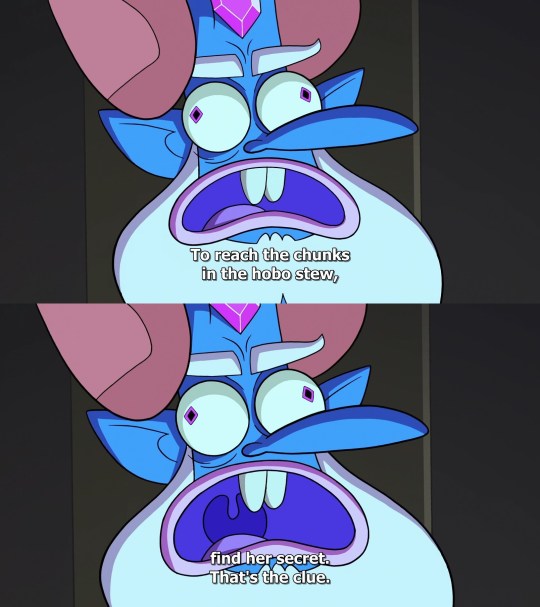
So strong emotions = dipping down --> Marco = source of very strong emotions for Star. Not the only source, but definitely the main one, especially in S1 and S2. This is an important point for Star’s whole character arc: it’s true that in S3 and S4 there are going to be less meaningful Star - Marco interactions, and that they’re both going to have many more moments of growth while interacting with other characters, but that’s the whole point of it. At the beginning of the series both dorks are walking disasters; by interacting together, by complementing each other and their shortcoming, they slowly mature into something better, individuals who are now ready to start stepping (slowly, very slowly, their journey won’t be complete until the end of the series) into the real world and take on it. So while I’m the first one who got frustrated and saddened by the relative lack of Starco moments in later seasons (relative is the keyword) it’s also important to keep in mind that it never meant that their relationship became less important and relevant, just that during their first months together they left a real and tangible effect on each other, leading to meaningful growth that allowed the writers to believably open up roads to different kind of interactions and “plot devices” for growth. This is what I mean when I say things like “meeting Marco is what allowed Star to defeat Toffee”. Obviously there are several degrees of separation, and several moments of growth / plot for Star that didn’t even involve Marco, but without their meeting she wouldn’t have matured as fast, she wouldn’t have had the opportunity to confront herself with a friend who was ready to help put some order in her super messed up life life. From the Book of Spells: “When we are together he sees the chaos in the world and sort of embraces it”. This is a direct quote from Star’s diary, something the writers of the show wanted to point out before S4 while referring to early S1 Star.
Marco has been, since the beginning, the first and most important key to Star’s development (even if not the only one), the “force” that first allowed her to start her journey toward maturity and become the kind of person who could go from being “a skimmer” to being proud of being “a dipper”. And in this S2 premiere we get a very direct taste of it, with Glossaryck using Marco as a bait to help Star learn.

Important bonus: the face Star makes for a handful of frames after having seen a naked Marco being YEETed across her room.

MR. CANDLE CARES (2x02a)
I wrote a lot about this episode in multiple posts, so I’m going to be extremely focused on the Star - Marco stuff only this time:
Marco smiles like that when he sees Star getting out from the office, and it endlessly warms my heart.

Both Star and Marco are clearly not thinking about each other in romantic terms in the slightest during this episode, the former harshly denying the possibility of any feeling for her bestie, the latter not being ashamed in the slightest about talking about creative making out techniques to trick Tom into revealing himself. And yet just two segments earlier Star didn’t want Marco to read a part of her diary where she might have said something crush-related. Unconscious feelings, Heart and Mind not agreeing on something, it’s always the same deal, the whole show is going to play with this idea of extreme disconnection between what one might feel and what one might consciously know they want (concept directly introduced in Sleepover) as a way to justify the ever growing emotional intimacy between Star and Marco while taking their sweet time to actually deliver any romance related developments. We all have to accept it, or it becomes frustrating and impossible to read some of the passages in the series, especially during S3 and early S4, because we’d get lost in trying to plot the trends of their feelings on a graph and that’s a fool’s errand. When the show wants to tell us “A CHARACTER FEELS SOMETHING STRONGLY AND THIS THING IS IMPORTANT” they’re not subtle about it, and that’s vastly more important than anything else.
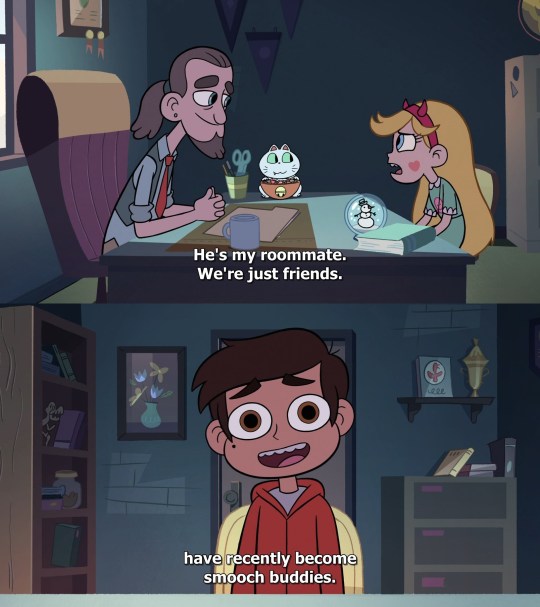
Marco stops playing to dreamingly appreciate Star and state how endearing he finds a part of her personality which might be frustrating to most (and it is to Tom, despite him also being attracted to it at the same time).
Appreciating your partners’ quirks is Love Story Writing 101, and this is going to be particularly evident in Curse of the Blood Moon (”I like every single thing about you”) and Here to Help (Star chuckling at Marco’s clumsiness). In this specific case it’s obviously premature to talk about “love” and it’s mostly a delicious bonus that presents a comparison between Tom and Marco, evidencing both their points in common (they’re both fascinated by Star’s personality and individuality) and differences (Tom is frustrated by this part of Star’s personality as well, since it doesn’t mix well with his controlling nature, while Marco learned to embrace it).

The important part, my favorite example to show people why and how Marco had an incredibly important influence on Star’s growth, especially during the first part of the series: Star spends most of the day panicking over Mr. Candle and then her mom’s words, she feels trapped in a role she didn’t want, lacking any freedom and prospect in life beyond her role as a future queen (interestingly she feels stuck in life, just like Marco in the following episode, but not out of lack of direction, but excess of it!). Then Marco gets home, talks to her for twenty seconds, and he immediately manages not only to calm her down, but he also gives her a new perspective on her life, and on her possibilities as a princess (and we know that she is definitely going to use her authority in her own way during S3), all of this while always following the style outlined by Blood Moon Ball: not a teacher or someone who tells her what she should do, just a friend nudging her in the right direction, telling her what she needed to hear. A Version 1.0 of his speech about finding your own happiness from Beach Day, in a way - the theme of free will and self determination was present since the beginning, even if at the time there obviously seemed to be less freedom in Star’s life, since she was supposed to inherit the throne, eventually.

Bonus points for the Alphonse The Worthy’s portrait from Blood Moon Ball moving his eyes to look at the two hugging, and for the demon highlighting with “point Marco” that he ultimately won the day when it came to wanting to be at Star’s side. Minus point for Star still acting coy at Tom’s compliment showing that she still had unresolved attraction for him.
RED BELT (2x02b)
The events of the episode itself aren’t particularly related to Starco, but it formally introduces Marco’s own “coming of age” arc, by telling us that he’s scared about being stuck in life, left without a goal or a purpose and without any meaningful connection. Needless to say that the “squire arc” from Sophomore Slump to The Knight Shift is going to address this, and that Star (as a person, but also as a mean to step into a bigger world) is going to be fundamental for Marco’s growth. While talking about the series premiere I mentioned that Star’s main role in Marco’s life is helping him become a better version of himself, stepping out of his comfort zone and managing to find his own path toward fulfillment and happiness, and Star is not just going to be extremely important for this, in different ways during the many different arcs, but she’s eventually going to be identified as THE single most important element. In The Knight Shift Marco is going to realize that he wants a lot of things from his life, that he wants to make experiences and slowly decide what he wants to do in the future without being scared about having to figure out everything here and now, lest being left behind, but he’s also going to realize that Star’s presence is essential to his happiness, that their relationship is the one lifelong post he feels like he has to commit, despite being just a teen with all his life in front of him.

So Red Belt doesn’t really have any relevant Starco interactions, but it introduces a part of Marco’s journey as a character that’s going to be incredibly connected to Star’s presence in his life.
As for the nightmare itself, don’t ask. It uses a lot of generic dream-like imagery to make things confusing and symbolic, with some elements from the first half of the season (Mr. Candle, the colors green and purple, associated to the magic subplot, the suit from Bonbon The Birthday Clown...). Maybe the Blood Moon being there was on purpose, a symbol for “you’re worried about having no goal in life, but your friend can be the key for you to gain maturity and fulfillment!”, maybe it was just “red belt, red balloon, spooky imagery... let’s put in the Blood Moon!”. Lots of things in visual media are done just for “rules of cool” or to give the scene a particular kind of mood that can help focus the attention of the viewers.
STAR ON WHEELS (2x03a)
This episode, in its extreme weirdness, is like an a super condensed recap of the important parts of Star and Marco’s relationship - with focus on the Star’s side of things, but there’s also some for Marco:
Star she gets excited about Marco teaching her something about Earth culture - riding a bike, which at the same time is also something new that could be compared to her getting her wand;
She overdoes and she messes up / can’t properly handle the situation;

Marco gets overwhelmed by this, but then learns to embrace the weirdness of Mewni / magic for Star’s sake (more or less like what happened in the first episode, or at least during her first encounters with Star and her world);

and Star has to come to terms with the fact that she’s in another dimension now, embracing part of it just like Marco did, and growing from it, and Marco has a big role in convincing her about it;

And while it’s at it, the episode includes other important themes (central to Star as a person in general, but in this case highlighted through her interactions with Marco), such as Star’s stubbornness and hostility toward doing and learning stuff when just told what to do,

and the resulting moment of learning and growth when Marco, instead of just “ordering her” what to do, gives her some of the trust that she desperately needs, and with it the confidence to actually try and succeed on her own (this all connects to the larger arc of Glossaryck teaching Star stuff in unconventional ways).

And since it never hurts we get reminded one more time how much Star resents being lied to and how important trust is to her.
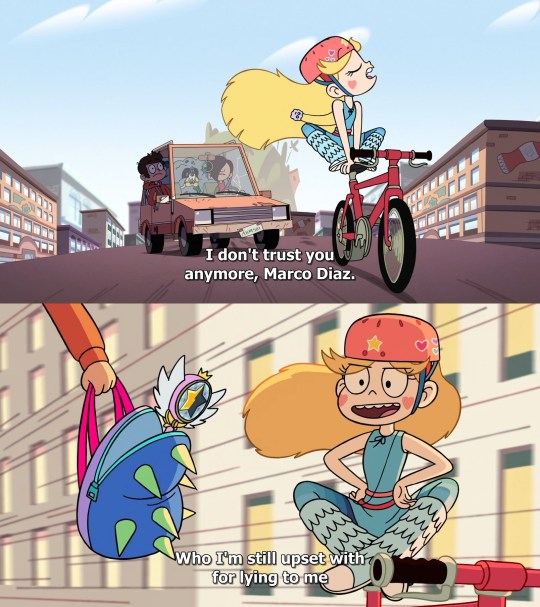
Obviously the whole episode is extremely silly, the whole situation requires a lot of suspension of disbelief to work and the “emotional moments” of the episode are extremely hammed up - we get a heartwarming “I trust you.” moment when the situation at hand involves learning to ride a bike! But it’s still a good way to have in a slick 11 minutes long package a super-cut of (part of) what Star and Marco brought into each other’s lives, and how that affected them and their way to interact with the world.
FETCH (2x03b)
Wow look in an episode that directly introduces the “stop running from your problems” arc for Star we get told by Sta herself that having your own Marco is important to give you the support you need to feel less overwhelmed by life - and thus less prone to ignore problems, it’s almost like he’s important to her in that way and that in Lint Catcher the dubbin vows when she makes him her squire further drive home the idea that he’s her ideal companion.

STAR VS ECHO CREEK (2x04a)
Another episode about “running away from problems”, in this case Star physically runs away from her problems and tries to avoid consequences. And sure, at the beginning of the episode Marco tries to tell her not to run away and we could argue once again about the positive influence and role Marco has on Star, but we know about it already. What’s REALLY important and huge is that by the end of the episode Star, the same person whose greatest fear in S1 was going to St. Olga and thus losing her freedom, gets convinced while talking with her own subconscious that going to prison (= facing problems and consequences instead of running away carefree) is a better alternative to never being able to see Marco again.
This is the same concept I talked about at the beginning of the post: it’s not like Marco is the ONLY important person in Star’s life, she obviously loves her family as well and in later seasons she’s going to interact with other characters as well, but at this point of the story Marco is the person who she actively cares the most about, and the one who better understands her (this is going to be a constant throughout the series, obviously), so almost all big moments of learning and self reflection for Star are somehow related to him. And while saying that Marco is the most important person in the world to Star (and vice versa) might not have been entirely correct by this point of the series (mostly because we lacked proper perspective), it becomes absolutely true by the end of it, as their choices in Cleaved highlight.
So yes, sure, logically speaking, and going beyond the simple plot of this episode, Star would have missed a number of persons if she spent her life hiding just to run away from her problems, but as far as early S2 experiences and subconscious goes, it all relates back to Marco, one way to another. After all we know that they both had an intense and special relationship from the beginning, and it’s going to keep being something unique that they don’t share with anyone else throughout the whole show, even when they’re going to date other people, even when there aren’t going to be as many episodes featuring both of them together.
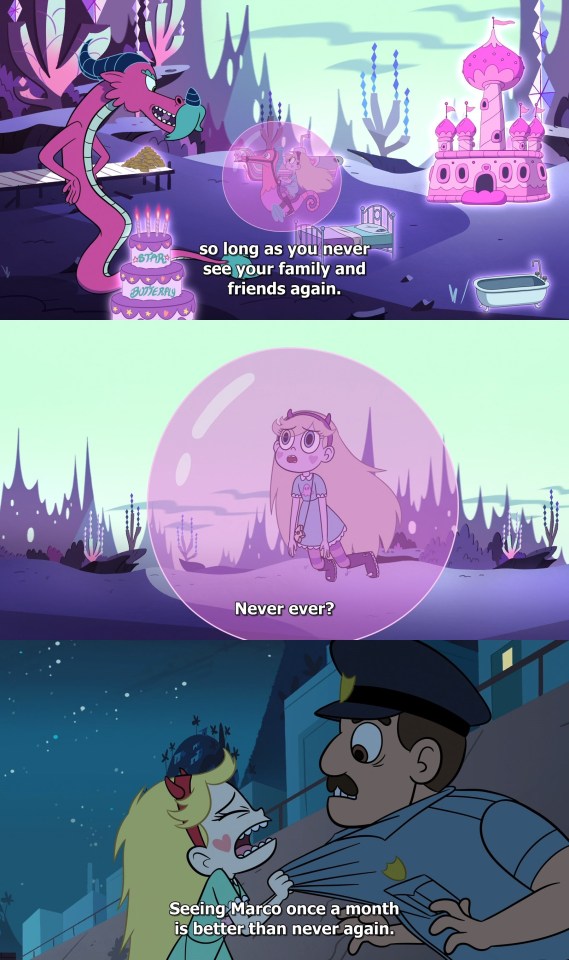
Bonus gratuitously adorable shot. Marco didn’t love-love Star from the beginning, we know that, but Gloss damnit, did he LOVE her from the beginning. I know that the series might not have had the best of pacing and some choices concerning shipping planted doubts and frustration in many fans, but no other two characters in the series come even remotely as close to Star and Marco when it comes to unabashedly caring about the other to incredibly extremes. THIS is what Marco means when he says that he felt like this from the beginning, and THIS is what Star means when she says (albeit in her diary in the Book of Spells) that she never connected with anyone else in the same way. This has never changed in intensity throughout the show (if anything it grew), even if it got the spotlight of an episode way less frequently.

WAND TO WAND (2x04b)
Yet another episode about Star learning not to avoid problems and responsibilities as much, and another episode that doubles down of how important Star’s feelings for Marco (I mean “feelings” in the broadest possible term, not as in “still unconscious crush” only) are for her magic. I already said this like five times, but I really want for the point to come across: I’m not saying that everything Star does, learns, or everything concerning her magic, has to relate to Marco, Starco, or to her growing crush on him, nor that Marco is the only one who ever helps Star grow. What I mean is that during all of S2 Marco is the single biggest source of feelings for Star, and this includes good stuff and negative stuff, such as all the emotional turmoil cased by Jarco. But this all plays into helping Star mature, culminating in Starcrushed. The S2 finale constitutes the climax to Star’s “stop running away from problems” arc, culminating in her accepting her role as a princess and going off to face Toffee, but this goes hand in hand with confessing her crush to Marco. Star finds the determination to grow and take The Plot™ head on, thus eventually saving Mewni (multiple times), and this part of her character arc is inextricably connected to her “learn to admit your own feelings for Marco” arc. THIS is what establishes their relationship as utterly special, and what allows me to claim that Marco had a fundamental role in Star’s coming of age story, well beyond the limits of what he personally and actively did with and for her.
When the series shows us that Marco is the key to Star tapping into her magic and better learning to use it it’s not because of some lore or plot related connection between the two, or between Starco and Magic - we have seen that’s not the case: magic is connected to emotions, and Marco happens to be the single biggest source of emotions for Star. That’s what it’s all about.
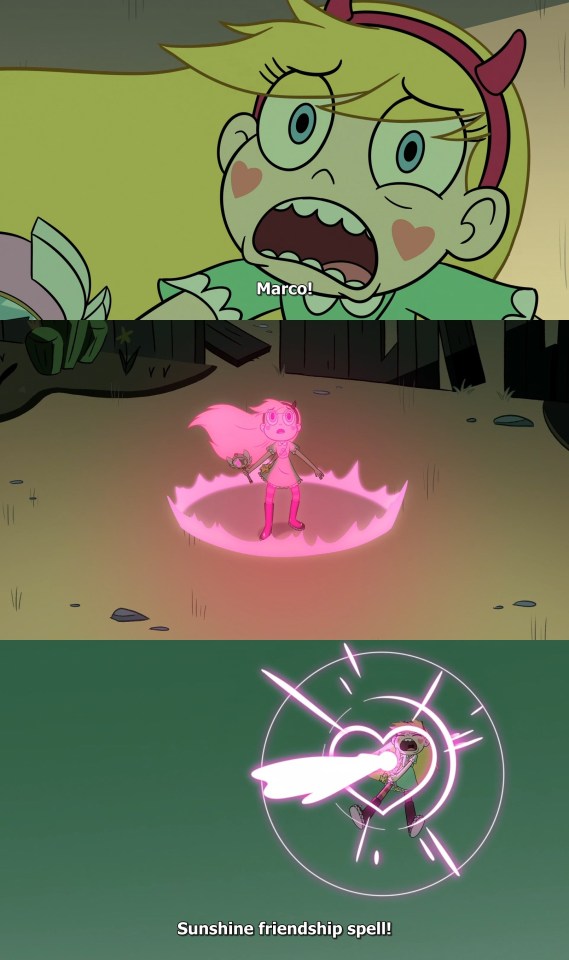
The episode ends with Star using brooms to fix her messes instead of magic, which is yet again a nice moment of “Star embracing part of Marco’s world”, but it’s not really that important in the big picture since it’s not like Earth’s ways are inherently better, it’s just important for Star at this point of her arc.
STARSTRUCK (2x05a)
Marco being right about Mina and still not rubbing it in Star’s face at the end is very cute and sets a difference between most of cartoon relationships and Starco, but it’s not that important, this is a solo-learning episode for Star.
CAMPING TRIP (2x05b)
This episode is like a fanfiction come to life, in a good way. The idea of Star’s crush on Marco is not going to be directly introduced until Sleepover, but in this episode she still acts differently, we are shown a side of Star that definitely leans closer to thinking of Marco as more than a friend - and this contributes to the main plot of the episode, where River is presented as a dad going through a middle age crisis, worried about losing her daughter to some boy who’s going to take her way from her home. AND YET NOTHING IS CONSCIOUS YET. THAT’S HOW THE SHOW DOES IT. During the episode Star is unmistakably closer to Marco usual, “happier” to spend time with him, but that doesn’t change anything in their relationship in further episodes and that still doesn’t help her be any more conscious about her feelings until Just Friends. There’s absolutely no contradiction here because it follows the inner rules the show adheres to.
I love this scene. Eden’s delivery of the line is incredible, conveying the eagerness in Star’s voice, a different kind than what we are used to and that immediately suggested (even at the time the episode aired, when we didn’t have the luxury of hindsight yet) that something was different. Not as in “something inside Star changed”, as I said we are still far away from any epiphany, just that the writers and boarders wanted to show a specific side of Star’s inner sphere in this episode.

And it’s even more interesting in hindsight, because comparing this scene with the dance in Curse of the Blood Moon, Mama Star, and Here to Help, shows us that Star and Marco (in this case it focuses exclusively on Star, Marco is denser after all) have always been very close to acting on their feelings - the entirety of them, and that they were usually just distracted by other things (other romantic interests, being stupid and dense, fear of change). When they have a moment to be alone, just the two of them, free from any other concern and focused just in each other, they immediately start to inch closer to embracing all of their relationship.
Let me clarify:
In Curse of the Blood Moon Star and Marco finally actually fall in Love for the first time after having danced together for a minute or so. Obviously the episode itself was a moment of high stress and tension, but once inside the Severing Stone they didn’t have to think about anything else for a moment. “We do this and everything will be fixed, we’ll be free of these obnoxious, unwanted feelings that get in the way!”, and by thinking that they let their guards down for a moment and enjoy each other’s presence, focusing on nothing more for the span of a dance, and that’s enough to lead them to understand that they do like it, a lot, and that they’d want to always be like that and that they had been running away from something beautiful all that time.
In Mama Star as soon as the Magic washes away all of Marco’s concerns and emotional blocks, he immediately confesses his love to Star, baring all of himself and revealing that what he desires the most is always being at her side.
Here to Help presented us once again with a context of stress and high tension, sure, but while in the barn Star and Marco could focus on themselves and nothing else for a moment, forgetting all about Mina and Mewni and anything else, and we know how that ended.
So I don’t mean that Star was about to confess her undying love for Marco in Camping Trip, just that the situation that was about to unfold (before River’s arrival) would have allowed for Star to focus less about “Marco is just a friend and you don’t feel weird things for your friends”, and more on “being with Marco makes me happy”. Which is the very essence of what “With or without magic we belong together” stands for.
“Let me just subtly remind you that Marco and Star have a positive influence on each other and that their meeting is the meeting of dimensions and cultures” - The Show

“Let me just subtly remind you that Marco and Star have a positive influence on each other and that their meeting is the meeting of dimensions and cultures” - The Show

The whole “River thinks Marco is Star’s boyfriend and that he stole her affection from him” is clearly played for laughs, but we still get an external character validating Marco’s efforts in helping Star out, and he also essentially approves of Marco being Star’s boyfriend. Which means absolutely nothing (with the exception of Wrtahmelior in Lake House Fever parents never ever butt in their kids’ relationships in this show, so their opinions have never been considered relevant when shipping is involved), but it’s still nice.

Bonus: Star is specifically animated looking at Marco in several occasions throughout the episode, way more then usual, “stealing glances” even. External link to the GIFs because Tumblr sucks and they’d make the whole post too heavy to load.
STARSITTING (2x06a)
In case you weren’t persuaded the first eighteen times I said that Star and Marco complement and help each other grow and be the best version of themselves, here’s an episode explicitly telling the viewer that. With a side of “dorks acting like parents” and a generous helping of “one day they’ll also understand they love each other” because there’s no way they didn’t want to tease that as well with the way these sentences are constructed.
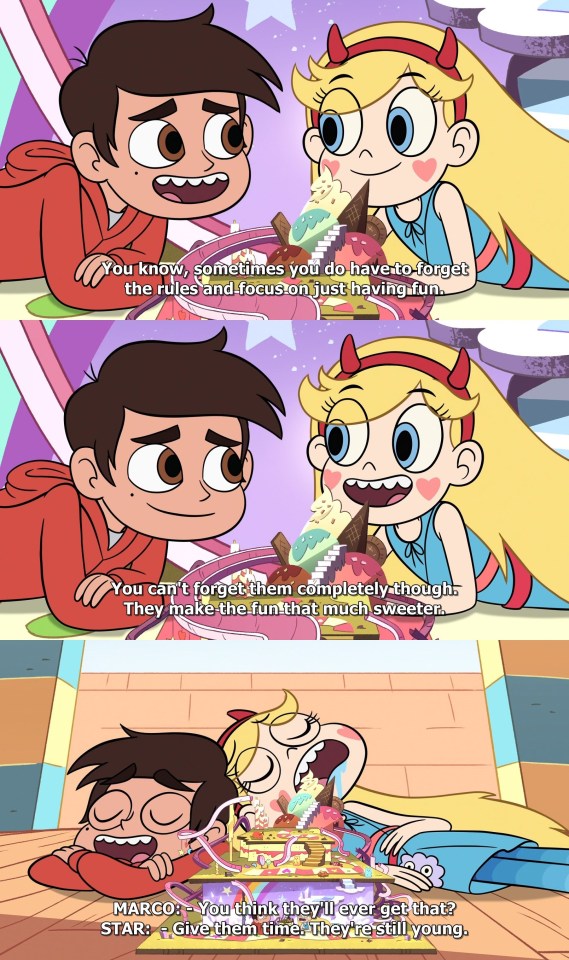
Bonus points for Star complimenting Marco for his skills with babies. DAD MATERIAL. ONE THOUSAND BABIES.

BY THE BOOK (2x07b)
This episode doesn’t really have any important Star - Marco interactions (even if it sure has cute ones, team work is the dream work. That’s how the saying goes, right?), but it reinforces the idea that Star learns things only in unconventional ways, something that often involves Marco during S2.
GAME OF FLAGS (2x08a)
Ignoring for a moment that Marco gets invited to what’s a family event, and that Star eagerly pairs up with him as Them Vs Her Families (ok I know that it makes full sense given the plot of the episode and it doesn’t mean there are any “Star and Marco as family” undertones here, but let me dream a bit ok?), the important stuff comes at the end: just like he did in Mewnipedence Day (albeit in a more direct way this time), Marco opens up Star’s eyes to the reality of the situation, snapping her out from a tradition she accepted without ever questioning it. And she doesn’t just back down, she tries to change things, she steals the flags, risking her own health, to claim the hill for all of them and change for good the nature of the event, just like she’s going to try and change Mewni. Once again the importance of Marco’s role in Star’s arc is evident, and once again he’s not a “teacher” who tells Star what to do, and even less a “savior” who has all the right answers for Mewni. He’s just a concerned friend who knows what kind of person Star really is, and who can give her a new perspective on things that helps her mature her own, personal, unique views. Views that are eventually going to forever change Mewni.
MEETING OF TWO INDIVIDUALS, MEETING OF TWO DIMENSIONS. The show begins with Star and Marco meeting it ends with their dimensions being cleaved together, they BOTH brought a new perspective on life to the other! It’s more apparent for Marco, since his advice pushed Star in a direction that has big effects on the plot itself, but Marco’s life was completely changed by Star as well, if in S3 he’s able to move to Mewni to have his “French Summer” and then in S4 he understands that importance of being true to what you want to commit to it’s only thanks to the crazy princess who helped him get out of his shell and make his first steps into real life. THIS is the very essence of what the show is, of Star and Marco being the tools to each other’s growth and happiness!
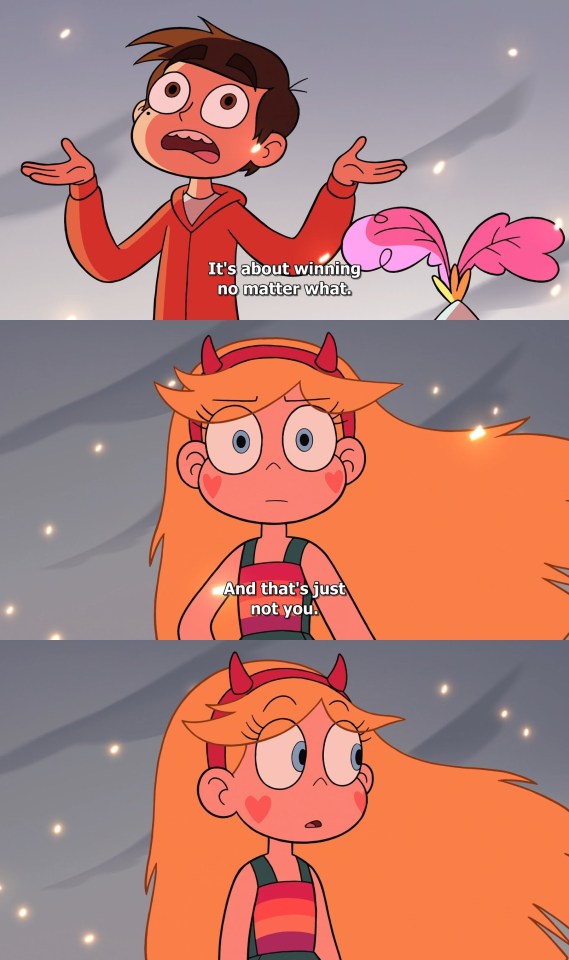
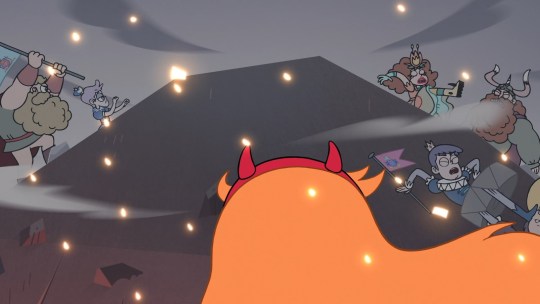
SLEEPOVER (2x09a)
One might expect a long section about this episode, but I’m going to keep it short: forget about all the “but how does the Cube work?” “who did lie?” and stuff like that. The important messages of the episode are crystal clear:
- Star Butterfly has a crush on Marco Diaz. No matter how conscious or unconscious it was at this point, the show told us directly, not just through undertones and themes anymore, that Star had specifically romantic feeling for Marco as well.
- Feelings are confusing. You Heart might feel like it wants something, but your Head doesn’t know that and it thinks you want something else. This is what the series bases everything related to relationships and romance on. This is why Star can be utterly convinced that she likes Oskar, at this point of the series, while actually having growing feelings for Marco. This is why Marco can move to Mewni, leaving Earth and his old life behind, while still not realizing the full extent of why he felt such a need to be with Star, and so on. The whole series plays with the idea that Star and Marco’s feelings for each other keep linearly growing throughout the show, but don’t always consciously influence their actions and thoughts in the same way.

And that’s why by the end of the episode the boarders can nudge our arms and go “Hey, hey, see that Star is sad when Marco ignores her because of Jackie? Hey, hey, that’s the seed of jealousy, that relates to love! Look at that!”, but then in Naysaya Star can be super happy for Marco scoring a date with Jackie. Dumb teens who don’t know what they want.
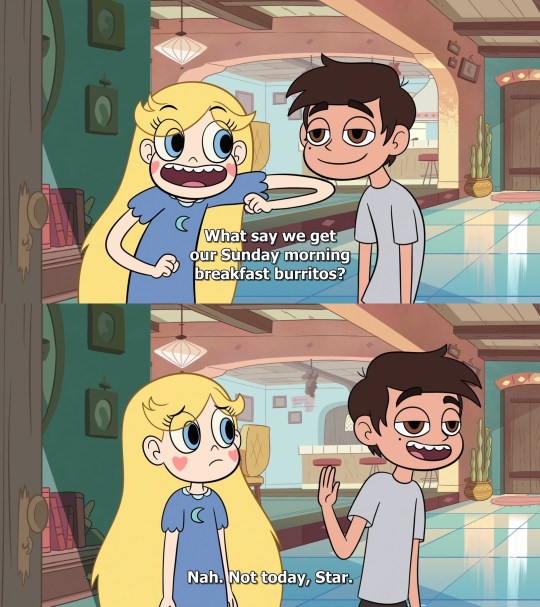
This line seemed so mature and deep at the little, little did we know the writers would have squeezed every last drop out of this concept as a way to justify things like Star and Marco completely ignoring their supposedly burning desire from Booth Buddies until Curse of the Blood Moon and then again until Mama Star. No, bad Seddm, no salt and negativity in these happy posts!
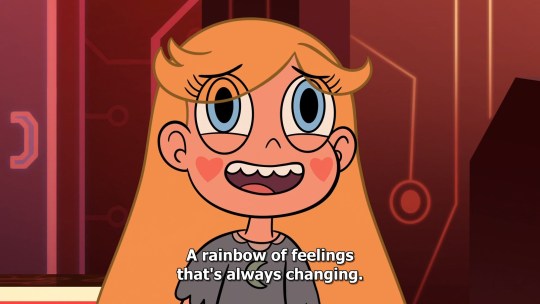
Let’s close this part here so that the core messages have more focus and remain more clear, but I wanted to point out that Star really loves involving Marco and having fun with him. Which is something we already knew but it always feels good pointing it out.

GIFT OF THE CARD (2x09b)
“Starco Teasing: The Episode”, also known as “How to have your main characters act like soulmates while still keeping everything in the episode frustratingly platonic only”.
From Star going [soft gasp] at how incredibly Marco looks in his ballet shoes
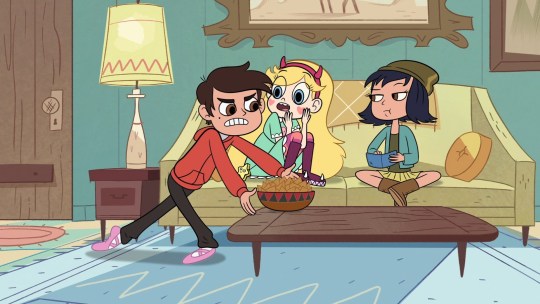
To the plot device of the episode being a gift for their anniversary... as friends, to everything else in the episode.
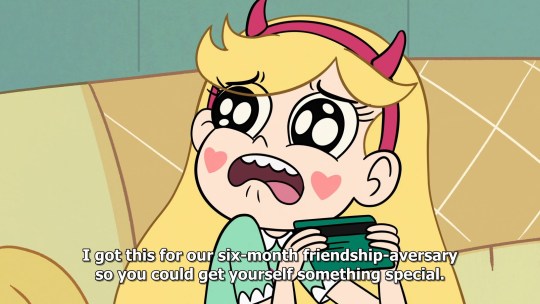
Ok this is clearly part of the gag but it’s also damn cute.

Star and Marco actually pour their hearts out with no recriminations here, and while it’s not something weird at all for this kind of scenes, where the characters think they’re going to die but the viewers are fully aware that it’s just the setup for a punchline, it’s still cute and a good example of the bases of their relationship.
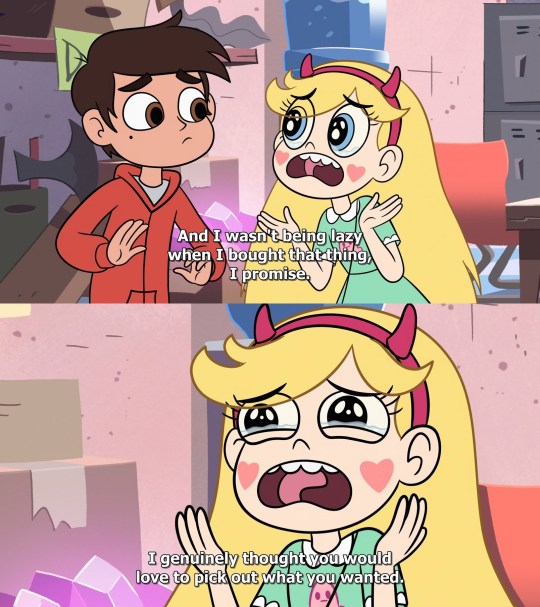
The fact that this scene is not played for laugh, and that Star genuinely appreciates Marco saying it instead of going “OH SO YOU WERE JUST TRYING TO SAVE YOUR BUTT”, goes in the big pile of “Why do I like Starco more than any other fictional relationship?” pile.
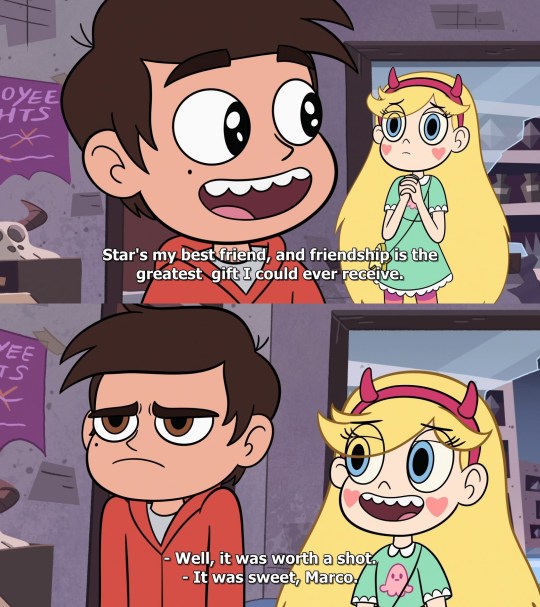
Never mind how horribly frustrating Marco’s “let’s die in each other arms so people will know that we were friends, yep, just friends, that’s the first thing everyone would think!” is: this is an alpha version of Cleaved, Star and Marco think that they’re going to die and that there’s nothing more they can do, and their reaction is to hug and hold hands, just wanting to be together in their last moment. The whole episode doesn’t really have high stakes and it’s clearly a silly, over the top adventure, but the emotions the dorks show are very real, and exemplifying of how in love (used in the broadest possible meaning, not with a strictly romantic connotation) they were already at this time.

And this is what Star decides to get excited about, not having survived. Again, a gag, but it still fits well, it’s not played for laughs with malicious intents or to mock their friendship.

PIZZA THING (2x12b)
Nothing major nor new since it’s something we saw as early as in the second segment of the series already, but Star has learned to enjoy a “calmer” way of having fun compared to what she was used to on Mewni, thanks to Marco’s presence, being more than happy to watch TV on the couch instead of going partying around, sometimes. Also the whole concept of “Friendship Thursdays” is adorable.
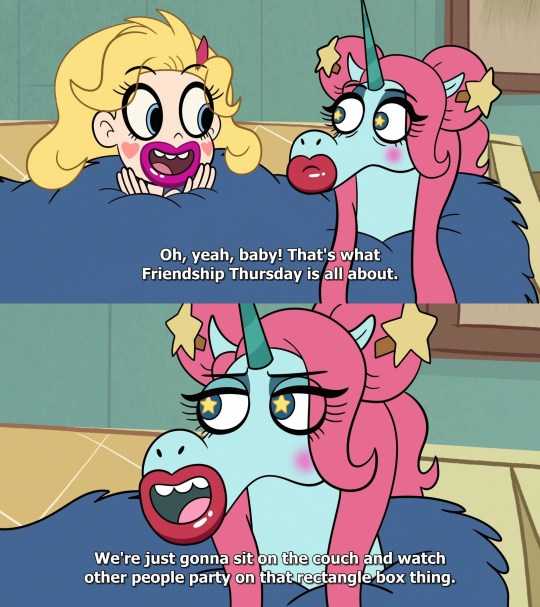
NAYSAYA (2x13b)
“How can Star be this eager to help Marco out with Jackie and cheer for him when in Sleepover she was s-” HEART AND MIND DISAGREEING SHE DOESN’T KNOW WHAT SHE WANTS she genuinely likes helping Marco and making him happy and won’t fully realize until Just Friends that this just means pushing him in the arms of someone who is not her, shut up!
With this out of the way, this episode features The scene showing just how much Star helps Marco getting out of his comfort zone, taking risks that go well beyond kicking monsters and going into other dimensions and becoming a better version of himself, one who can achieve his own happiness (Jackie is a small part of this, this concept of “achieving happiness” is going to be much more relevant in S4 and Star’s role in it for Marco - and viceversa - is literally going to be the main attraction during the series finale).

Hey look, Marco’s biggest fear is being alone (as in, feeling alone as an individual, without meaningful connections, not being literally alone) and without a goal and a meaning in his life. And for a time he’s going to delude himself in thinking that Jackie and school can be that, but then in Sophomore Slump he has to slowly accept and realize that Star is the only one who can give him that!
Wowie it’s almost like they deeply changed and influence each other’s lives.
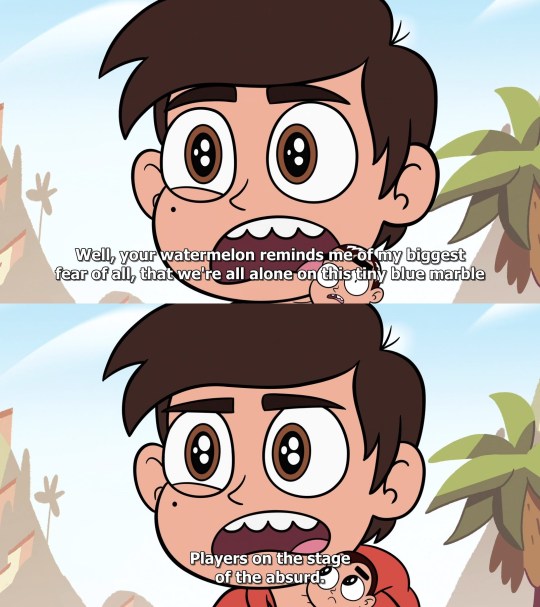
BONBON THE BIRTHDAY CLOWN (2x14)
I’m going to put this as a disclaimer at the beginning of this part so that I don’t have to explain later: during this episode Star clearly displays feelings and behaviors that can only be explained by having a crush on Marco and feeling an intense need to be with him. But the episode begins with Star cheering on Marco with Jackie, and is followed by several other episodes of Star being none the wiser about her feelings for it, and definitely not showing them. Why? How? Heart and Mind disagreeing; denial; being scared of change; blaming all her uneasiness from the night on having lost Glossaryck thus overwriting the other feelings until Just Friends; a combination of everything, you pick your poison.
This is a minor note, but both Star and Marco regret having forgotten about their already existing plan with the other for the prom, with Marco’s “Jackie High” lasting about half a second before he once again goes “Oh no Star, no hurt Star!”. It’s just a setup for the episode and doesn’t really play any role, but it’s a welcome breath of fresh air compared to the easy drama most shows from past decades would have immediately built up from this kind of situation.
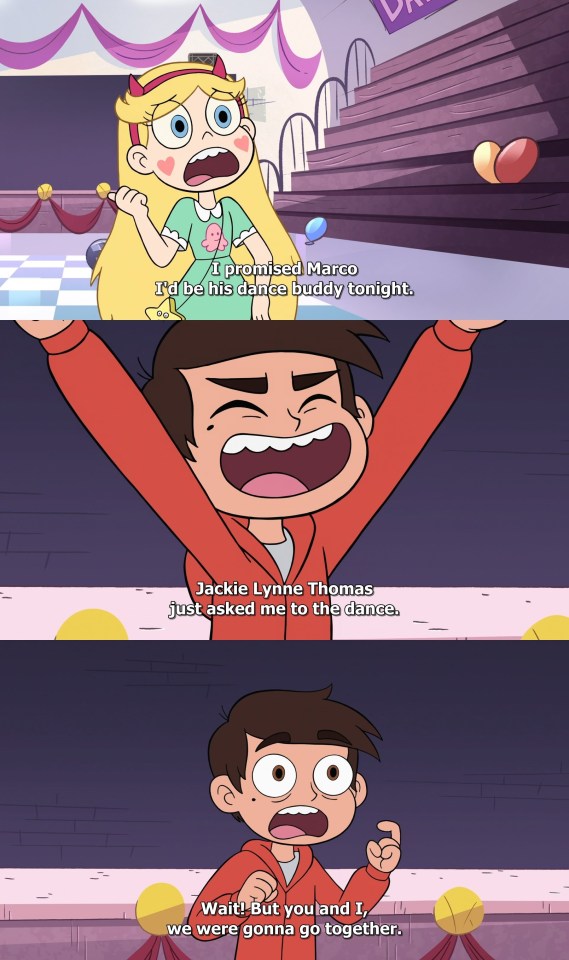
Star is super happy to greet Jackie, right now her mind still hasn’t put 2 and 2 together, she still hasn't processed “If Marco is going to a promo with Jackie as her date, he can’t possibly be romantically involved with me”. It’s all still a very unconscious process now (she won’t properly think “I want to smooch him but I can’t” until Just Friends), but it’s a painfully clear case of “You don’t know what you truly wanted until you lose it”, as evidenced extremely clearly both visually and by the subtle as a hammer on your teeth song (this scene here, Just Friends, Lava Lake Beach, song get used as a way to highlight and give exposition to the characters’ feelings multiple times in the early days of Starco).
Darned if I knew
That I'd find you
In the last place I thought you would be
What could I do
'Til I saw you waiting for me?
Ooh-ooh-ooh, ooh-ooh-ooh, ooh-ooh-ooh
And if I catch your eye
It feels like I could fly
Out from my lonely world into yours
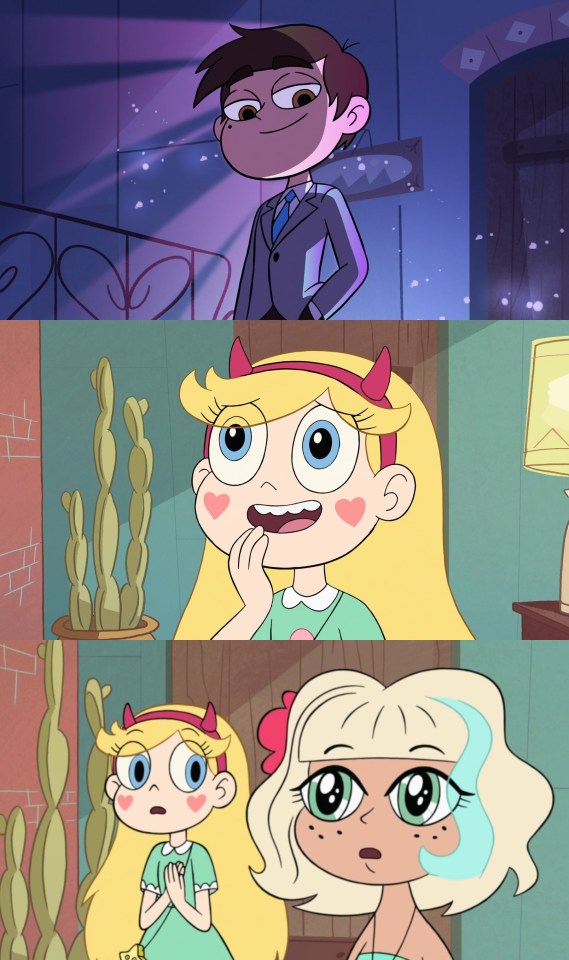
Following that, Star spends most of the episode feeling weird: she looks at the picture on her phone and feels bad and tries to find a reason for that, something to blame for the new feelings she’s experiencing.
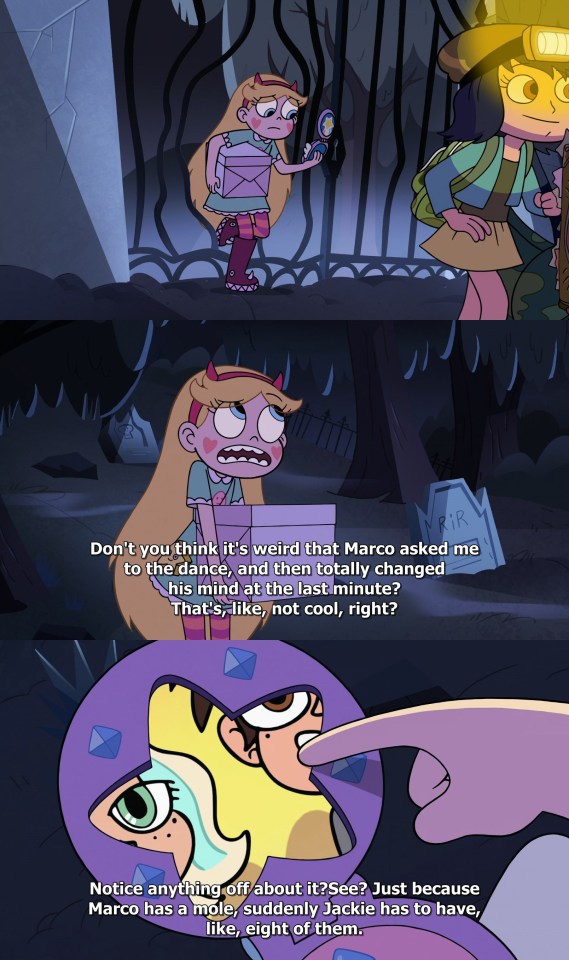

For a moment, when she uses the All Seeing Eye spell, she might have understood, or at least made a direct connection between Marco being on a date with Jackie, and her feeling like that. But the epiphany escapes her grasp after an instant, due to her magic going awry, and after that Ludo’s rat immediately gets there and she has other things to worry about.
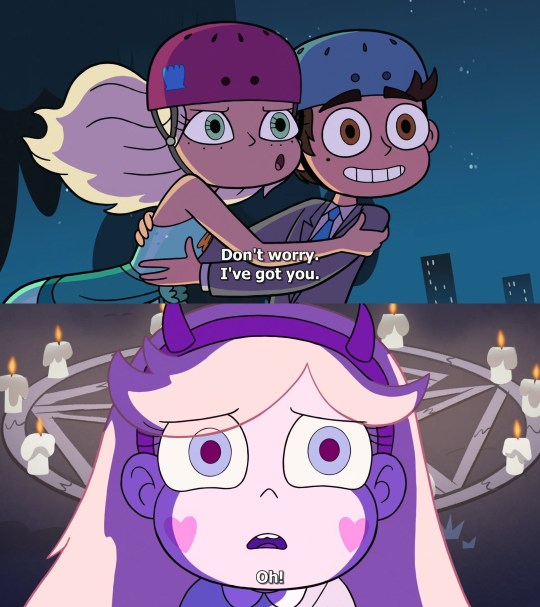
Going back to Marco’s side of things for a moment, a quick consideration about what’s clearly a Jarco moment, a moment of connection between the two of them: we get a character external to the Star-Marco dynamic acknowledging Marco’s tenacity and perseverance, a quality that early Star lacked (”looks like I’m just a skimmer”) and that’s going to become an important part of her later on (”I am a dipper”, never giving up with the Monsters and Eclipsa in S3 and S4). One of the most clear examples of how Marco’s good influence helped Star change for the better, and this is the first time he gets outright praised for it.

After the kiss Marco sees the Blood Moon, and he’s immediately reminded of Star and goes to check on his phone, noticing the missed calls and getting worried. Was this part of the curse? Was the Moon trying to hinder Jackie and Marco’s relationship? Absolutely fucking not, as Marco said the curse is bullshit and was never a thing. In the context of this specific episode it’s symbolic, nothing more: Star is always in Marco’s thoughts, we know it and no one can deny it, the Blood Moon was merely a visual way to remind him of her, and to tell us viewers that even while kissing his long time crush, Marco still keeps part of his being focused on Star. He could have seen a little girl playing with a magic wand or hear someone say “the stars are beautiful tonight!” and it would have had the same effect. There’s nothing magical here, and if there’s it’s not important; it’s not even a good thing for Star, since Marco and Jackie’s arrival at the graveyard is actually what makes Star lose control of her magic, losing the fight.
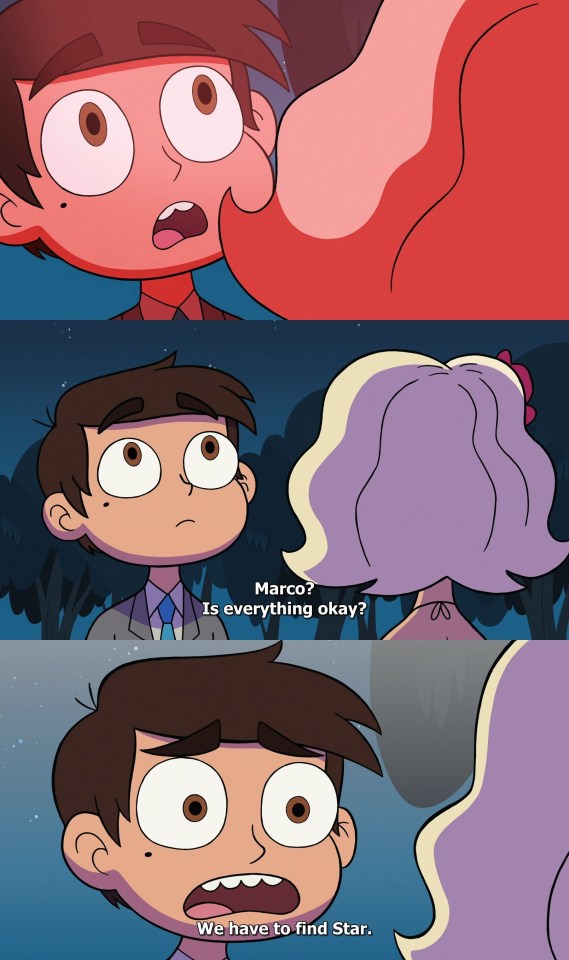
Marco saving Star is a cool and sweet scene, and sets a clear parallel with Wand to Wand (and we even have confirmation from the storyboarder that it was on purpose, not that it wasn’t clear enough already) that neither of them would ever let the other go, but there’s not much to be said about it, their commitment to each other is pretty straightforward and it’s obviously to be expected in dangerous situations such as this.
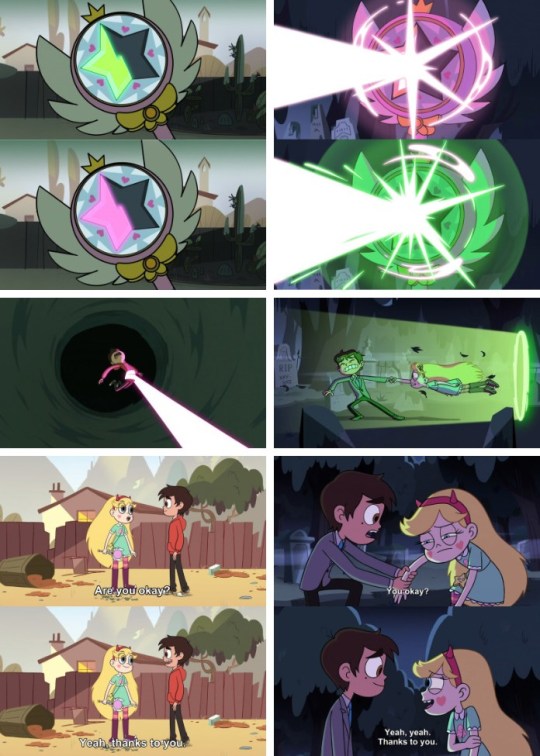
Also, it’s not a full parallel: in this case the moment of danger doesn’t end with a hug, but with Marco going to check on Jackie (after having helped Star up obviously, he’s still and will always be worried about her after all).

And yet, despite this, by the end of the episode Star entirely blames her sadness on having lost the book and Glossaryck. She’s still clearly hurting over Jackie and Marco, but the situation at hand gives her an easy way out, an excuse to latch on to “cover” her feelings for her bestie with a thick layer of “no no it’s definitely just this” (wow just like in Curse of the Blood Moon!). And thus the epiphany that she almost had while spying on them is delayed until Just Friends.

Neither Star nor Marco are clearly aware about it obviously, but it’s hard not to see that “I’ve lost Glossaryck” line as “I’ve lost you” as well. Fun times.
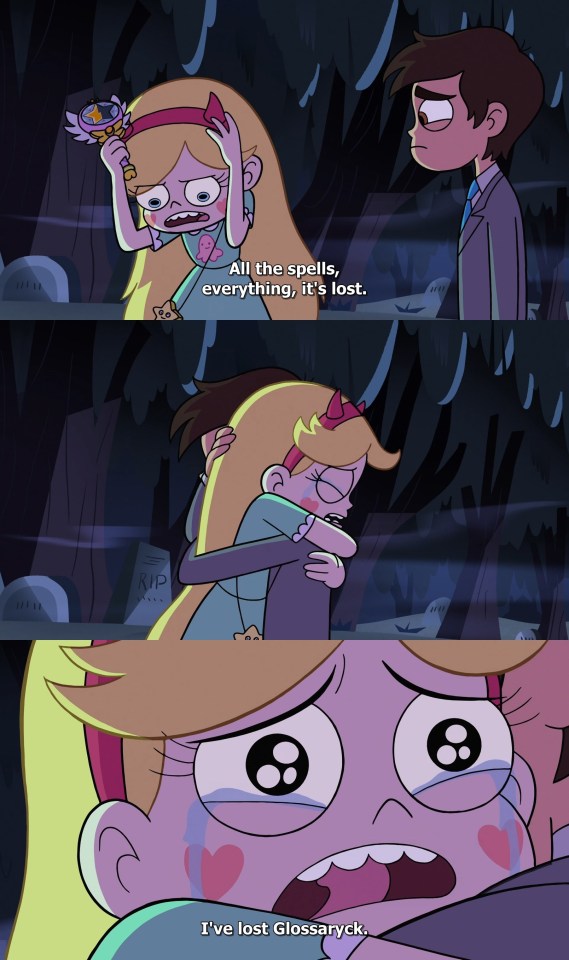
To conclude, going back to something from the middle of the episode (didn’t want to digress earlier): this scene with Glossaryck asking Star if he can burn a page from the book and Star telling him to do whatever he wants is another side to the “you don’t know what you wanted until you lose it”: Star barely cares about the Book, symbol of her duties as a princess, but in a handful of minutes - and for future episodes - she’s going to be terribly hurting over having lost it. As I said multiple times the arcs of “Star learning to stop running away from her problems and accepting her responsibilities” and “Star recognizing and accepting her feelings for Marco” go hand in hand, and are both integral to her development and character arc. And, as we are going to see in the season finale, neither of them can truly reach its payoff without the other.
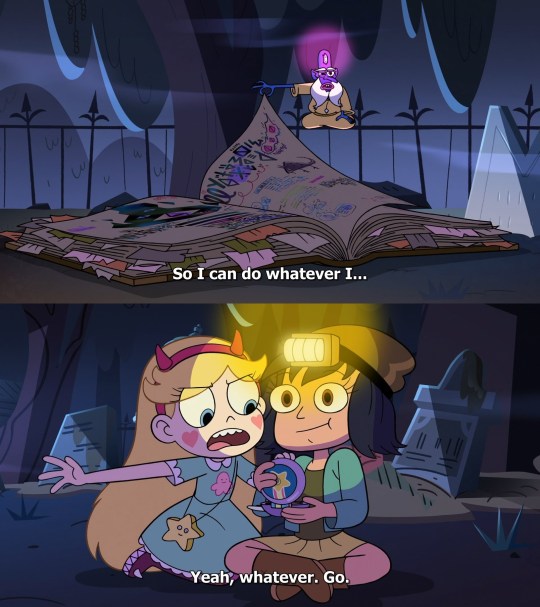
Bonus to make the whole episode a little less painful: while helping Star and Jackie up Marco might give Jackie more focus, but his tone of voice is way more kind and warm and delicate with Star, showing an incredible amount of care. Clearly this doesn’t entirely match Marco’s priorities in this moment, but it’s a welcome gift from Adam (and Daron I guess, since she’s always present during the recording sessions and certainly directed him to deliver the line in that specific way).
104 notes
·
View notes
Text
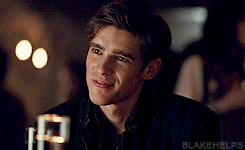
silence ! raise the royal standard, for the prince of russia and king consort of england, MAKSIM ROMANOV, has arrived. being 27 years old, he is out of line to the throne. many around the court call him the mutineer, by virtue of him being dexterous and maverick, while also being recalcitrant and brazen. — played by brenton thwaites.
- THE BASICS.
full name: maksim alexei romanov
name meaning: maksim ‘the greatest’, alexei ‘defender’
known in history as: king in the shadows, the white wolf
date of birth: june 21st, 1639/1992
age: twenty six
star sign: cancer
profession: freelance photographer (modern verse) / prince of russia, king consort of england (royal verse)
loyalty: russia, house romanov, england and house windsor, the entente
alignment: chaotic good
mbti: estp
spoken languages: russian, english, advanced french, intermediate german (royal verse) / english, russian, basic spanish (modern verse)
mother’s name: tsarina tatyana romanovna
father’s name: tsar ivan romanov
siblings, if any: anastasia romanovna-du bourbon, dmitri romanov, vasiliy romanov, karina romanovna
height: 6’0”
hair colour: brown
eye colour: dark brown
- BACKSTORY / MODERN VERSE.
it was an odd thing being born as one half of a whole. coming into the world knowing you would always have another at your side through every new experience. maksim and dmitri romanov were two sides of the same coin from the day they first wailed their first cry. growing up, maksim was determined to stick by his brother’s side for everything. for a time it had only been the three of them. just anastasia, dmitri and him. they had forged a bond early in those days, sharing absolutely everything with eachother that would translate into their adulthood. maksim was patient with his siblings, understanding and above all else, never judged them.
growing up under the roof of the infamous media moguls, tatyana and ivan romanov, meant that maksim came with a brand that would follow him everywhere. one that only grew when the family began starring on their own reality tv show. everything he knew about himself, he discovered on the cameras. his whole personality shaped around the person he was expected to be for a show. he was less keen of the cameras than his siblings, but his appearances often provided the comic relief with his brother and he became a hit with the younger audience. the first time he’d seen something he’d said on a t-shirt had still been pretty wild though.
because of the huge spotlight on the family, the twins were sent off to boarding school for their education where there would hopefully be less scrutiny. most of the kids there had parents far too rich to bother about another one joining their rankings, afterall. and it proved to be one of the most helpful periods of his life. boarding school offered him the chance to decide who he wanted to be because trying to work out who you were with a camera shoved in your face was near impossible. though he never consciously made the decision, he had constructed a character in his years on the show, one that would meet the expectations of viewers watching. if anastasia was going to play the part of overbearing older sister, then he would play the lovable but dimwitted jock brother. and for years that’s who he styled himself as.
in truth, maksim was all that and more. yes he liked rebelling and making trouble, but he was happiest at home with a good book or at the local art gallery. whilst he loved any and all sports, his shelves were filled with comic books and limited edition collectibles. it was away from the rest of his family that he could finally grow into himself. realise the things he truly enjoyed to do, the things that he was good at that he didn’t have to share with his other four siblings.
boarding school proved to be destiny in more ways than one. as maksim was finding himself, it led him straight to the love of his life. victoria was at the local girls boarding school, and it took just one school dance for him to fall utterly head over heels for her. they dated all throughout school, never once tiring of the other. she was a grounding force for him, encouraging him to focus on what he wanted and go for it. and in turn he brought thrill to her life that she lacked with such rigid family expectations. they were a perfect match all things considered, and so it was to no ones surprise ( and karina’s absolute horror ) that maks proposed. the couple are now planning for their wedding, which promises to be a grand summer spectacle to all those lucky enough to earn an invite.
whilst he had everything he wanted in victoria, his future still remained a murky mess. every year, maks would go to his careers interview with his school adviser. and every year, he would shrug his shoulders when asked what it was he wanted to do with his life. he knew that his mother was desperate for him to go off to university as anastasia had, and that all hopes were on him because there was no way they’d be able to wrestle dmitri into another classroom once he was off scot-free. and so, despite the fact that he had exactly zero interest in it, when the time rolled around maksim applied to study history. at least it would get the careers adviser off his back, and college might be fun - right?
wrong. maksim managed to make it through a month of studying before he went home to go to a concert he’d planned with dima months ago. and then never went back. literally never. sayonara to all those shiny pots and pans his parents had gifted him, and the macbook that had one half finished assignment on it and not much else. and so he was back to square one.
rather than sit around at home moping for the camera, maksim took off for a year and went travelling. sure the family had been on some pretty decent holidays over the years, but he wanted to see more. he sent various postcards home from his time in thailand, indonesia and brazil. with everywhere in between. eventually he settled in australia for six months, taking up odd jobs where he could and collecting a group of like-minded friends. all people running away from adult responsibilities for that little bit longer. so while his girlfriend was earning herself a useful degree, maksim was surfing and bungee jumping his way through his inheritance.
it was during his time in australia that he discovered his love for photography. he’d always loved art, and shown bounds of creativity growing up. whenever he grew too anxious or was failing to concentrate, it was drawing that often centered him. just doodles at first, then panels of his favourite characters from comics. but it was travelling where he really began to utilise the natural eye he had. what began as photographs to share on his instagram, turned into scrapbooks that he would send to victoria to keep her as involved as possible in his life. it was a happy accident that people began to take notice really. the odd person began asking him to take photos of this and that, offering to pay for a headshot here and a small wedding there. nothing major, but enough that maks began to consider it as a real career option. with ana’s persistent encouragement and help, he set up his first photography instagram and took the first step into adulthood.
upon his return to the states, maksim got serious ( as serious as he was capable ) about his career as a freelance photographer. he set up his own website and bookings flooded in. most were either mocking him for his family’s name, or fans, but enough that he could really begin to make a living out of it. with most of his inheritance depleted, it made the whole going out on his own thing all that more tangible and exciting. plus, the freelancing gave him the opportunity to keep up with everything else he wanted to do in life. never making him feel too tied down with responsibility. he could work his jobs around whatever holiday or event he had planned. he didn’t need to hang up his thrill-seeking for good in exchange for the not-so-promised land of being a grown up.
maks is still a photographer, and in the midst of wedding planning. he still makes frequent appearances on the romanov reality show with his other siblings, all of whom he keeps in very close contact with. he splits his time between his parents house and the home he shares with victoria and his pet, danya. finally, he has found his place in life and it’s one that is always changing. and thank god for that, maksim couldn’t bear the thought of an average life.
- BACKSTORY / ROYAL VERSE.
no romanov was born lonely. this could be said twice true of maksim, who came into this world minutes after his twin and thus claiming his destiny as the spare heir between two tiny red fists. one so intrinsically linked to a life of forgotten mediocrity the child would likely never escape. and yet he never felt that left out growing up. yes it was odd that he didn’t have the famed bright romanov eyes of frozen blue and green ( his did not shine, just two hazel pools ) but he had his father’s look about him. that unkempt charm that had warmed the russian people to him in the first place. still, the children at court teased him when the tsarina was not around, jesting that he was no true born romanov like his siblings, but tatyana set them straight with an icy glare. assuring her son that it was not a look he need possess; he was a romanov because of the blood in his veins, the love his family bore him and the loyalty they gave him.
still. the dreaded sword of the middle child hung over him the elder he grew. all around him, his siblings seemed destined for greatness. dmitri, the future tsar of russia, who would remain at home in russia as they all craved. anastasia, who would one day be queen consort to one of the greatest nations and alliances their mother could possibly bring about. vasiliy, a third son, was near ten times smarter than he would ever be and would prove an asset to any crown he advised, he was sure of it. and karina, the baby of the family and yet already so sure of her own mind, and so doted on as the youngest. maksim adored each and every one of them, and was proud to be brother to their eminence. he was a good man at heart, and cared for his family deeply as was the romanov way, taking up the mediator hand in hand with vasiliy to quell the chaos of their family. for though he was gifted with a boisterous disposition, he was far more level-headed than the elder two and often brought logic to otherwise ridiculous fights. but he lacked a purpose of his own. though he was quite the charmer, always flirting with ladies at court and wreaking innocent havoc with his elder siblings, there was no talent of his own to focus on. maksim was intelligent in his quiet way, a strategic mind just waiting to be sharpened if only someone offered him the chance. if someone would just look to him, just once.
the tsarina and tsar grew anxious for their lost boy. their other children all seemed so certain of their path, of their skills and talents, and maksim stood in the middle of it all with nothing of his own to claim. it was his mother ( she had always lavished affection on her third, never wanting him to feel lesser with two elder siblings already lining up for a crown ) that had guided him to a purpose. urging ivan romanov to encourage battle strategy and warfare in maksim, to forge him into a warrior and hero. at fourteen, his lessons began and maksim took to them like a duck to water. wielding sword and shield as if he had been born for knighthood, not life as a prince. though he still has moments of doubt about how useful he is to his family, at least now he had a skill to prove himself.
and he needn’t have waited long for a chance. war had raged throughout europe for long enough, and he had remained unaffected for far too long. when armies were called, both he and dmitri at just eighteen were sent with the imperial army into war as generals. and maksim would be given his first taste of war and combat outside of a tournament or training. and it was glorious. until it wasn’t.
the rush of the fight didn’t linger long, and months away from home soon sapped all that naive boyhood from his features. the brothers saw eachother through their first kill, steadying their twin soul until they could stand again at their side. maksim proved able of compartmentalising the worst of it all to deal with at a time where the horrors could rip him apart in the safety of his own home. for so long he had lived without responsibility, always the spare and never the heir, and yet it was war that forced him to step up. to care for his brother in the way he had always looked after him. years of loyalty, repaid at the worst time. still, the brothers managed to find glimpses of light, including rescuing two stray puppies that they hoped might keep the darkness at bay at night. they named the terriers danya and nadya, and vowed to keep them safe until they could return home.
the terrors of war left scars unseen on the young prince, despite returning home relatively unscathed. it was the brutal separation from his twin brother that had left the greatest trauma behind. they had been together all their lives, and together when they’d been parted - both with the matching scars as painful reminder. maksim had been knocked unconscious and awoke to the sharp realisation that his brother had been taken. when he eventually found his way back to camp, all the men turned to stare as if they’d seen a ghost, not a bloodied prince returning from battle. the romanov twins had been missing and presumed dead for days, and yet it had been the most useless one that straggled back. it didn’t take long for the tsarina to call maksim home, grieving the loss of her eldest and too fearful to lose another. maks returned to the winter palace with the two bundles of danya and nadya, the sole link he had to dima, and a promise to keep them safe in his absence. he was hailed a hero upon his homecoming for the strength he had shown in war, the sacrifices he’d made. but the medal pinned to his jacket had brought more nausea than it did pride. what good was dressed up metal when his brother hadn’t returned with him?
the months following passed in a blur. dealing with stately visits as the new elder in the family, with anastasia long since whisked away to france, in between the moments of solitude he sought where he would paint to ease the terrible things he’d seen or play with karina who so often clung to him in those first few days. even sneaking into vasiliy’s imposed quarantine when he could to keep his brother’s spirits high proved a much welcome distraction. it was only as the war came to a head, and foreign rulers from all over began to take note of the damage they had sustained, that things began to change.
a summit had been called at bern, and all foreign rulers were invited to attend in the name of peace. not only was this an opportunity for the tsarina to aid in ending the war and to reunite the family with their long lost russian princess, but to further her already fruitful alliances. karina was still unwed, as was vasiliy, and so both came with maksim to the summit in hopes of securing other strongholds in europe. maks, of course had long since been taken. from a young age, a betrothal with the princess of england, victoria, had been arranged for the young prince. they had met once upon a time as children, but had not taken to eachother as their parents had hoped. but the young couple were reunited at bern, their countries now on opposing sides of a war that their marriage could be useful in ending. maksim had been determined to dislike her, and so of course he had fallen for the fair victoria the moment he had laid his eyes on her.
it didn’t take long for love to grow between the two royals. maksim especially grew taken with her strong will, sharp mind and seemingly unreachable beauty. it was shaping up to be quite the fairytale, until the succession of england’s throne had been thrown into chaos with the queen’s deepest secret now uncovered. the future king charles, was of no royal blood at all, but a bastard born from an affair of the queen’s who swiftly lost her head for it. it was victoria who was now the heir, and that left maksim once again out of use, left out in the cold. england sought a better alliance now that victoria was now crown princess. though eventually things were settled, maksim proving he could be a worthy consort, this period of time left him feeling more insecure than ever of his true worth.
with the matters of succession sorted, maksim grew unsure about his future responsibilities. he had never really wanted a crown, only dreaming of the russian throne if it meant he could remain with his family forever. he doesn’t believe himself worthy of it in any way, certainly not good enough to stand at victoria’s side as her consort. he was a warrior at his core, an honourable one, but that made it no less true that his mind was not made for negotiating at high tables. maks doesn’t want to be any kind of king, but he wants to be with victoria. it is that undying need to make her happy and keep her safe, to do anything she asks of him, that has kept him by her side. even if it means making himself a reluctant ruler. this was only solidified by the attempt on her life during the pirates invasion of bern, an assassination attempt on the newly named heir to the throne. almost losing her was all the confirmation he needed that he would never leave her side. and a good thing too, for the time between their marriage and coronation was shorter than they could ever have prepared for. during the final days of the summit, the now infamous explosions struck bern, leaving multiple casualties in its wake. one of which had been the king of england, making victoria the overnight queen.
life was turned upside down once again with his arrival to versailles as the newly crowned consort of england. dmitri had resurfaced after years of them living with the belief that he was long dead. the romanov’s had come to terms with their loss, just barely piecing back together a heart that would always be missing a jagged piece. now maksim must struggle with the old and new parts of himself to reconcile with a man who wears his dima’s face but is not the brother he once knew. all whilst struggling with responsibilities he never asked for, and a wife who has lost more than she could ever deserve.
#! * INTRODUCTIONS.#! * INTRODUCTION / maksim.#is this your brother????#ALSO if anything is too god-moddy yell at me and i'll change it duh#but there was so many other characters to mention in this that i probably fucked something up#like there's a 50% chance i did#maybe 70%
3 notes
·
View notes
Note
Do you think Tsumugi was anywhere near as smart as Ouma or did she just have the advantage of blindsiding him? Even in his final moments, he didn't seem to suspect her any more than any of the others. Atleast that we get to see.
Someone asked me a somewhat similar question awhile back andput it in really good terms. I don’t remember the exact phrasing, but it wassomething about how if Ouma is a chessmaster (and I do think he is, given allthe evidence), then Tsumugi is an opportunist. I still think they really nailedit: opportunist is a perfect word forher.
If I had to compare how smart they both are in terms of justintellect? Ouma would probably be smarter. Considering he definitely seems tohave some variation of SHSL Analysis, his predictive and analytical abilitynearly rival Junko’s and Kamukura’s. Even taking into account the fact that hereally is genuinely childish and even klutzy sometimes, he still seems… well,like a genius.
Looking objectively at his 300-or-so page script which hadmulti-branching routes, predicted nearly all of his classmates’ behavior to aT, and was written in the span of 2 hours, he wasn’t “just smart.” That sort ofthing wouldn’t be possible for anyone unless they had some kind of talent orability that correlated to it directly. There are also the diagrams in hisroom, which he commissioned Miu to make. While Miu’s ability to actually inventthem is more than impressive, Ouma seems to be the one who actually thoughtthem up and designed them, which is absolutely astounding.
Assuming that he was a genius of some kind also explains whysometimes he seems like he has to rewind himself and put himself a few stepsback, like in Chapter 4 when he literally can’t understand why they’d think he’sthe culprit. The answer is clear to him, since he already knows the full factsabout the case, and everyone else’s remarks must’ve felt like the trial wasjust dragging on so slowly. When you’re haughty and self-confident like Ouma,feeling like the smartest person in the room means everyone else seems to begoing so slow. Sometimes he reallydoes seem taken aback before he manages to backtrack a bit and look at the casefrom their perspective, even though they’re all still stuck on the wronganswer.
By contrast, Tsumugi doesn’t seem to have these nearlysuperhuman abilities. She’s smart—verysmart, actually. But her smarts still feel within the realm of humanpossibilities, rather than her being on an entirely different level from anyoneelse. If I had to think of a character who she’s probably equal with in termsof intellect, Komaeda might be a good choice (it’s kind of hilarious that oneof her FTEs has her specifically hating on people who use fictional charactersas “stepping stones” to get famous). Both of them are incredibly smart,arguably smarter than a lot of the rest of their classmates. But they’re stillultimately human, and circumstances can and do catch them off guard prettyregularly.
Komaeda simply allows his luck to make up for the holes inhis plans, while Tsumugi doesn’t try to cover the holes in the first place. Asan opportunist, she’s capable of rewriting entirely new scenarios, or claimingcredit for things that she never actually planned in the first place. Thisallows both of them to take chances and risks in a way that characters likeOuma, Junko, and Kamukura rarely do. The former are genuine risk-takers whoknow they’re smart enough to handle themselves in the long run. The latter(particularly Ouma and Junko) might act as if they take risks, but very rarelydo. Instead they leave as little to chance as possible, relying instead ontheir own huge brains and analytical abilities.
As you said, Tsumugi’s best and strongest advantage oversomeone like Ouma was her ability to blindside him at all. And make no mistake,this ability to fly under the radar is something she’s very well aware of, justas Komaeda is aware of his own luck and the fact that it’ll typically makethings swing in his favor. She mentions it outright in her FTEs, citing exampleslike hopping a subway or going to the movies without paying for it because noone would notice her anyway. It’s no coincidence that she talks about how plain(地味)she is almost once per line of dialogue: if anything, she wants to drill intopeople’s heads exactly how unnoticeable and boring she is so that they won’treally pay her much mind.
This plainness of hers works really, really well againstsomeone like Ouma. Ouma is an intentional subversion of Junko in many ways, butit’s true that they still share certain parallels—including their need for thespotlight. Ouma wants things to be “fun” and “interesting” and “exiting” at alltimes. He hates boredom (yet another thing he has in common with characters whohave SHSL Analysis). Therefore, he tries to avoid it at all costs. Someone likeTsumugi who seems to be the embodiment ofboredom just put him off entirely. I’m not even entirely sure if he consciouslydismissed the idea that she was the ringleader, or if it was more of asubconscious aversion.
Either way, I think he was unable to close in on herspecifically because he, to some degree, was using chessboard thinking.Chessboard thinking is a type of game theory in which you try to predict youropponent’s next move(s) by putting yourself in their shoes. It has itsadvantages, but obviously it only works best if you can actually predict youropponent. Otherwise you make mistaken assumptions. And you’re always going tobe somewhat biased, as you’re thinking with your own logic, rather than theirs.
By thinking “what would I do if I were the ringleader?” Oumamade the mistake of thinking that the ringleader would act like himself. He fitthe role of “evil villain” so perfectly because he was playing a part, and heexpected the real ringleader to mostly act the same—but that assumption waswrong from the beginning. He and Tsumugi were on completely differentwavelengths the whole time, and he never, I think, predicted that theringleader could be someone so… absolutely boring.
Something I’ve always felt is ironic is that I think Oumaprobably could’ve predicted a mastermind like Junko far better than he could aringleader like Tsumugi. Kirigiri did it before him, after all, and he andKirigiri are more than paralleled on several occasions. His and Junko’s similarmindsets would make them a formidable match against each other (though it’sanyone’s guess who would actually win a debate between them, since Junko hasabsolutely no conscience while Ouma is deeply empathetic). But since he wassearching for Tsumugi all the time, he wasn’t ever able to realize what wasright in front of his face.
This really did allow her to blindside him completely, as heremarks bitterly in his talk with Momota in Chapter 5 once he’s explaining hisplan. He realizes quickly that the ringleader must’ve manipulated Maki as apawn into kickstarting the killing game into action again, but has no idea how they actually did so. Because heshut himself up in the machinery bay with no way to maneuver around the schoolor investigate for himself, he allowed holes in his defenses for the firsttime, and Tsumugi took advantage of it spectacularly.
She might not be a genius herself, but she’s plenty cunningand quick on her feet. Her ability to revise her own scenarios, and to makethese huge, sweeping claims for things with no way to prove that she didn’tactually do them, means that she can seem a lot more capable than she actuallyis. Even when she’s clearly human and fallible, and when things definitely don’tgo according to her plan (such as when Saihara stops wearing his hat, when sherealizes Momota was sick in Chapter 5, etc.) she can bounce back quick enoughthat it’s near impossible to prove she ever messed up at all.
If Ouma is absolutely brilliant, then I’d say Tsumugi is…devious. She’s more than capable of compensating for her lack of genius throughher sheer dedication to her goals, as well as the fact that she doesn’t alwaysnecessarily play fair. While Ouma was mostly right in assuming that she had tofollow the rules of the killing game because it was being broadcast, he failedto account for the fact that she already had broken the rules long before herstatus as the ringleader was exposed. As long as she can get away with it, she’sabsolutely the type of person to cheat in a game—and her plainness makes itvery hard to notice she’s cheating at all, usually.
This is just my take on it, anyway. The differences in theirway of thinking are honestly fascinating, so I really love getting to talk aboutthe both of them. Ouma is complex in his moral ambiguity and in how much healludes to the themes of the game, but Tsumugi is also complex in herhollow-ness, and how terrifyingly effective she is as an antagonist. Thank youfor giving me a chance to talk about them both!
#ndrv3#drv3#new danganronpa v3#tsumugi shirogane#kokichi ouma#ndrv3 spoilers //#my meta#okay to reblog#zekefreek
130 notes
·
View notes
Text
Enneagram Type 9: The Peacemaker
The Receptive, Reassuring, Agreeable, and Complacent Person
Healthy. Healthy Nines are deeply receptive, open, unselfconscious, emotionally stable, and serene. Accepting, trusting of self and others, easygoing, at ease with self and with life. Patient and gentle, but also direct and unpretentious, they have an innocence and simplicity about them, and are genuinely kind people. Their attitude is optimistic, reassuring, and supportive; they make people feel comfortable and have a calming, healing influence, harmonizing groups and bringing people together. When healthy, Nines are also powerful and dynamic when they need to be. Their steadiness, common sense, and quiet strength are reassuring to others. They easily can see other people’s points of view, making good mediators, negotiators, and counselors. Their sense of well-being comforts and sustains others. Have enormous dignity, deep serenity, and real peace that come from acceptance of their human condition. At their best: Become self-possessed and have great equanimity and genuine contentment. Feel autonomous and fulfilled, paradoxically at one with themselves yet able to form more profound relationships because of their union with themselves. Become powerfully alive, awake, grounded, alert to self and others. Develop an indomitable spirit, like a force of nature — dynamic, connected, truly at one with life. They are exuberant, vital, and self-possessed.
Average. Average Nines begin to fear conflicts, so they become self-effacing, accommodating themselves and going along with others, saying yes to things they really do not want to do. Become agreeable and conciliatory on the surface, while maintaining an inner resistance. Start to use beliefs and stock sayings to deflect others or “airtight philosophies” designed to defend against change. Increasingly feel that they do not want to rouse themselves, and may accept conventional roles and expectations naively and unquestioningly — often idealizing and living vicariously through the other. Try to maintain relationships while resisting being affected by them. Do not want change, upset, or pressure of any kind. Can become passive, phlegmatic, unresponsive, and complacent, walking away from conflicts and sweeping problems under the rug. Claim to have few needs. Increasingly suppress desires. May be physically active but inwardly slothful, emotionally indolent, unwilling to exert the self. Nines exhibit indifference and lazy procrastination, stalling until problems go away on their own. Fill days with familiar routines and busywork, or perform tasks while feeling little connection with what they are doing. Confuse numbness with relaxation start to seek numbness through television, potboiler novels, and substance abuse. Begin to “tune out” reality, becoming oblivious to what they do not want to see. Much daydreaming, ruminating, dwelling in comforting fantasies, and “being mellow” — often spiritualizing these states as higher virtues. Disengaged, inattentive, and unreflective: thinking becomes hazy, unfocused, and ruminative, mostly about idealized notions of how harmonious and pleasant everything should be. Increasingly stubborn, uncommunicative, and resistant to being affected, although still able to be pleasant. If problems do not go away, Nines begin to minimize the seriousness of the problems to calm and appease others, to “get problems behind them,” and to have “peace at any price.” Become stoic, fatalistic, and resigned, trudging through life as if nothing can be done to change anything. A great deal of anger is simmering under the surface and sometimes explodes in bursts of temper. Have poor judgment. Wishful thinkers, they look for a solution that will solve their problems but that does not require effort or response on their own part.
Unhealthy. Unhealthy Nines are sitting on top of enormous unexpressed rage, and the effort to keep it out of consciousness exhausts them. They can become highly depressed, while the repression of their energy leads to inadequate personal development: they become increasingly helpless and ineffectual, and others must step in to save them from themselves. Terrified that their underlying anger and grief will emerge into awareness, they become obstinate, stubbornly denying that problems and conflicts exist, or that anything is wrong. Tend to blame the messenger, and to become angry with anyone who tries to help them address or even to acknowledge their real problems. Seriously neglectful and irresponsible, dangerous to anyone who needs them. If problems persist, Nines want to block out of awareness anything that could affect them. To defend themselves, they dissociate to a degree that eventually renders them unable to function. They become severely disoriented, depersonalized, catatonic, and immobilized. Emotional breakdown and personality fragmentation are possible.
Triad Issues. As the primary type of the Instinctive Triad, Nine is most out of touch with its own instinctual drives. These are replaced by ruminative thinking and emotional attachments to specific individuals and comforting situations. Instinctive energy is used to maintain boundaries against others and against disturbing elements within themselves. In short, Nines do not want to be “messed with.” They martial powerful resistance to being affected or changed by others or by powerful feelings and passions within themselves. To replace the lack of stimulation their instinctive energy would provide, Nines tend to live vicariously through others, identifying with a perceived “stronger,” or more passionate, person. They also have problems with aggression and repression: assertive impulses are repressed, as are the sense of self and other manifestations of their vitality and independence.
Direction of Disintegration. Average Nines are easygoing and agreeable, maintaining a positive outlook and, as much as possible, remaining unruffled by life’s ups and downs. But Nines, like anyone else, are not immune to problems or to getting upset by disturbing events. Their powerful defenses usually will help them to remain relatively calm and even-keeled in crises, but when problems get too overwhelming, the resultant stress may cause them to take on some of the behaviors and attitudes of average Sixes. At such times, Nines become visibly more anxious and reactive. Previously, they may have resisted looking closely at problems, but now the full impact registers, and Nines become more nervous and pessimistic. If the source of their problems is interpersonal, they may suddenly become reactive and defiant, like Sixes — in effect, telling people off and discharging their repressed frustrations. While this brings short-term relief from repressed stress, it usually does not resolve the real conflicts and problems that Nines face.
Unhealthy Nines can become extremely stubborn and highly resistant to experiencing their inner pain and anxiety. They martial the powerful defenses of denial and dissociation, but these defenses leave them so out of touch with reality that they can no longer function. When Nines go to unhealthy Six, they become overwhelmed by intense anxiety and paranoia that erupt into consciousness. They react hysterically and become fearful and irrational, lashing out at others while also becoming dependent on others more than ever to take care of them and solve their problems. Deteriorated Nines may masochistically bring about their own downfall so that others will save them from themselves and once again establish a relationship with them.
Direction of Integration. When healthy Nines go to Three, they become interested in developing themselves and their potential. They take control of their lives and value themselves and their contributions. They learn to invest their time and energy in activities that will hone their talents and help them grow as people. As their sense of self develops, Nines become more assertive, independent, and self-assured; their self-esteem also increases. They are more conscious, practical, and live in the real world rather than in their idealizations. Moreover, Nines find that they can enjoy being and expressing themselves fully without losing connection with the people who really love them.
Security Point. Nines can also “act out” the average behaviors of type Three, but most often with trusted friends and intimates. Nines want to be accepted by others and to sustain their relationships, and to this end, they may begin to adapt themselves to others’ expectations like average Threes. Nines can become more preoccupied with matters of image and appearance, or behave in ways that will charm others. Having safe and familiar conditions can also bring out more goal-oriented workaholic tendencies in them. With intimates, Nines may also risk behaving more narcissistically, wanting to be the center of attention and enjoying the interest of others.
Childhood Pattern. Connected with both parents or with other parent figures. Nines have open, receptive psyches, and as young children, they tend to take on much of the emotional tone of their family environment as well as conscious and unconscious expectations from their parents. But while the other two connected types, Six and Three, are able to focus on or react to the expectations of one of their parents (the nurturer for Threes, the protector for Sixes), the Nine is overwhelmed by the connection to both parents. The psyche feels crowded by the covert demands of other family members, so the Nine retreats to the safety of imagination where she or he experiences more freedom, peace, and autonomy than she or he generally finds at home. Some Nines learn to retreat literally, taking refuge in nature or with other children; others withdraw emotionally but remain physically present. In any case, they learn that their home is already full of assertive, demanding energies as well as various problems and conflicts. They attempt to keep a low profile, not to ask for much, not to assert themselves, and to be invisible, in the hopes that their presence will not add any more conflict or confusion to the situation.
Basic Fear. Of loss and separation, of fragmentation.
Basic Desire. To have peace of mind and wholeness.
Secondary Motivations. Nines want to have inner stability, to create and maintain peace and harmony in their world, to mediate conflicts and bring people together, to avoid conflicts, to preserve things as they are, to allow nothing to upset them, to minimize problems and conflicts, to defend the illusion that everything is okay in their world.
In Search of: Harmony and stability. Nines desire oneness, wholeness, and communion for themselves and others. They perceive an ideal order, a way things could be, as do the other two types of the Instinctive Triad, the Eight and the One. Nines attempt to bring a sense of ease, spaciousness, and simplicity to their external affairs by cultivating an inner ease, spaciousness, and simplicity. In effect, Nines want to find a genuine inner peace that will have positive effects on their 'outer environment.
Healthy Sense of Self. “I am a peaceful, easygoing person.”
Hidden Complaint. “I am content with the way things are, although everyone else is always pressuring me to change.”
Key Defense Mechanisms. Repression, dissociation, denial.
Characteristic Temptation. To avoid conflicts and self-assertion. For average Nines, directness, making their desires known, or taking a strong position feels like an aggressive act. Nines believe that if they assert themselves, they risk disrupting or even destroying the harmony that exists in their relationships. Thus they begin to think that by being conciliatory and subordinating themselves to others, they can maintain their relationships and their own emotional peace. Nines say yes when they mean no, which avoids conflicts in the short run, but which leaves them angry when others choose a course of action that Nines are not comfortable with. Repressed anger is the first step in creating the resistance, depression, and dissociation that create problems for Nines.
Saving Grace. Despite their growing resistance, unresponsiveness, and fatalism, average Nines may still value their relationships with others so much that they make the effort to break through their resistance and learn to respond to people as they really are rather than deteriorate into serious denial and negligence. Nines’ healthy capacity to be receptive to people may allow them to truly put the needs of others first, even at the expense of sacrificing their own peace of mind in the short run.
Structural Patterns. The keynote is self-effacement. There are two aspects to their psyches: first, the inner life of subjective feelings and fantasies, and second, the interpersonal relationships that give rise to their subjective states. Of these aspects, the dominant aspect is their inner world: only truly high-functioning Nines are able to consistently keep their attention on reality rather than on their idealizations of it. As Nines deteriorate, their attention becomes focused not on identifications with people or relationships but on their idealizations of them. For average to unhealthy Nines, the outward pattern becomes one of accommodation and self-effacement to others, but only to maintain their peace and ignore the outside world. Their inner life is dominated by fantasy, while they remain completely defended against reality, impregnable and immovable.
Cognitive Error. To seek peace of mind by diffusing their attention and by disengaging from their instinctual energy. They become “unselfconscious,” mistakenly thinking that their presence, engagement, and input do not matter.
Inevitable Consequences. If Nines continue to preserve a false peace of mind through resisting reality, repressing anger, and outwardly accommodating others, they will undermine their Basic Desire (inner stability and peace of mind) while increasingly bringing about their Basic Fear (separation and loss of those they love). Their very passivity and complacency, their negligence and obstinacy, and their unwillingness to deal with reality inevitably cause conflicts.
Indeed, Nines’ unconscious anger toward anyone who tries to make them respond against their will separates them further from others. The irony is that the type that feels so much at peace with the world is often the cause of frustration and conflicts for everyone else. By not taking responsibility for themselves, they compound problems and then must flee the problems they have caused. Further, the very defenses they employ to protect their inner comfort have the effect of distancing them from others. Others cannot break through to the Nine, and the Nine is gradually isolated, albeit in a numbing world of pleasant daydreams.
Nines must remember that real wholeness and real peace of mind are only possible by embracing the dynamic, changing nature of reality. Nothing stays the same in life, and to try to remain unaffected by the powerful changes around us is to remain in a kind of living death. In a sense, the Nine is like someone standing on the edge of a pool, sticking a toe in the water to see if he or she can take the plunge. Of course, the pool is life, and Nines are actually trying to find the courage to commit themselves to being here fully. When they do, they find the serenity and inner peace they have been seeking.
203 notes
·
View notes